#red embrace hollywood Morgan
Explore tagged Tumblr posts
Text
the trickster three.
Prince Hurst:
In the strange logic of your cyber-hopscotch, normalizing rape and underage female ownership, at least you’re unable to play victim now.
I’m sad about Shannen.
She presented herself as steely and composed, but to me she was a fragile young woman taken suddenly and in too much pain. If I glance at any artificial cancer campaign that I feel demeans real patients or preys on the public’s humiliations, I’ll call you out.
A Kate caption: “She’s gone through something awful.” Yes, marrying into the House of Windsor. Anything you insensitive superficial blokes wish to say to Michael Strahan? Why not? You’re both well-versed on apathy, and an easier life, might you shed light on cycles of chemo?
A headline: “Tyler Perry, godfather…” Except. He’s not. You don’t have Hollywood friends. Nobody likes the unvirtuous Rachel Rosa Shirley Henry Marty Luther imposters, living apart. I wrote of A Few Good Men in Washington, DC, that’s why. As if I wasn’t erased, gone, at all.
To complete the unobstructed view: Indigenous Peruvian tribe, Mashco-Piro, risked disease and violence days ago to emerge from the rainforest. The most uncontacted, most reclusive, most withdrawn tribe in the world knows me. Hello! Peruse a tribe called quest. Google: Mashco-Piro asks for food August 20, 2013 BBC. Video of hand on hair pose, elbows-out, asking villagers for bananas. Get them bananas! (just bananas?) Traditional plant-based food! They detest you.
In Xaviour Twitter, we’ve lifted digital camouflaging on Archillect, Murat Pak, Elon Musk, and Piers Morgan. The snitching is Minor 101. Cyber users spy your regalia. I want the amplification of your unremorseful felon admissions with a high chance of pedophile rapist to destroy any label of boyish humanitarian aid worker, so that you don’t get that award—even in irony—no Netflix series, no podcasting series, no prime-time interviews, no meetings with dignitaries, minimizing your godforsaken earthly imprint after four decades of calculated family pedophilia.
Minority Report. Tom’s in a technological nightmare. Clairvoyant humanoids, one female and two males, in a pool, visualize future crimes for a government organization. The rival boss is played by Ireland’s Colin Farrell. There’s this weird disconnect. In every scene, he chews gum. You’d think the movie’s integrity would be more important than Trident—wait. He’s warning a little girl of rapey pedos. No wonder you left California: Steven Spielberg knows what you did.
The avec moi politician I grew up with is also chewing gum in his video. It’s titled: 18 Year-Old Trudeau on Quebec Sovereignty. I’m 17. You’re 5. Which means the no-life, no-choice, rape clause in the crayon-kinship philandering legalese was already in place. Normal dad.
Details are vague, but back in twitter’s profile, I was wrapped in an old, old, red, looped Where’s Waldo scarf. Thrifty. Yes. One of the most iconic fashion designers knew me, read emails, published essays and Twit doodling, waited, and, I think, was disappointed I hadn’t yet realized you were certifiably evil. Seventeen days after your ivory wedding, Kate Spade hung herself with her signature red scarf in her Park Avenue apartment.
Then, Bed Bath & Beyond CFO, Gustavo Arnal jumped in NYC.
Then, Fandango founder, J. Michael Cline jumped in NYC.
Overly educated. Overly successful. With loving families.
But for now, we have you etching puerile algae about orifices and winning. As you do. On Piers Morgan’s son, Spencer Morgan’s Twitter page.
Three years after September 11, you staged a folly paparazzi scuffle in London to confuse people. Judging from the way you’re held back by guards, you’re mad. At that older brute for leashing a young love like a prized pet, so cruelly and prolonged, it ignited global pain and suffering. You did that. Why not embrace it? Google: 9 Cringe-Worthy Prince Harry Scandals We’ve All Conveniently Forgotten About. 2017 article. Number 5. Kennel Club.
I know your dad was equestrian-minded when I was younger than a teenager. I just don’t ink it on billboarded, televised, mural canvas. You and I won’t meet.
K
0 notes
Text
'When Christopher Nolan's historical epic "Oppenheimer" made its way into theaters, it did so fronting serious A-list energy in stars Cillian Murphy, Emily Blunt, Matt Damon, Robert Downey Jr., and Florence Pugh. Impressive as those names are, "Oppenheimer"'s extended cast of supporting players whom Nolan assembled is truly jaw-dropping, with names like Casey Affleck, Gary Oldman, Kenneth Branagh, Jack Quaid, and Rami Malek topping the list. If you scroll far enough down the "Oppenheimer" IMDb page, you'll even see the name of Mr. James Remar, who played U.S. Secretary of War Henry Stimson in the film.
If you've seen "Oppenheimer," you know Remar's character doesn't garner a ton of screen time. Like most of the film's supporting team, however, the actor more than made the most of his moments. He even added to one of the film's most powerful scenes, reportedly improvising the line of dialogue where Stimson removes Kyoto from the list of possible bombing sites in Japan in part because he and his wife honeymooned there. It's a powerful moment, to be certain. And it's just one of many Remar has delivered over the years.
Fans of 1997's "Mortal Kombat: Annihilation" hardly need a reminder of Remar's skill, as the actor put just as much energy into playing super-powered kung fu fighter Raiden in the film. Of course, given the video game adaptation's critical and commercial shortcomings, "MK: Annihilation" hardly ranks among the actor's biggest hits. And yes, Remar has contributed to quite a few hits in his decades-long career.
Mortal Kombat is but one of many intriguing entries on James Remar's resume
To be fair, the general shortcomings of "Mortal Kombat: Annihilation" hardly rest on the shoulders of James Remar, with producer Lawrence Kasanoff claiming in the 2017 book "Lights, Camera, Game Over!" that studio bosses forced the filmmakers to release the movie before it was actually finished. Lack of polish aside, "MK: Annihilation" has become a low-key cult hit over the years, with certain fans now embracing its schlocky, B-movie energy.
As it happens, that cult status is sort of fitting since one of Remar's first big roles came in Walter Hill's 1979 cult hit crime thriller "The Warriors." Remar was quick to capitalize on that early success, scooping up roles in hit '80s TV shows like "Hill Street Blues," "Miami Vice," and "The Equalizer." He'd also appear in celebrated films like William Friedkin's "Cruising" (opposite Al Pacino), Hill's Eddie Murphy vehicle "48 Hrs.," Francis Ford Coppola's "The Cotton Club," and Gus Van Sant's landmark indie "Drugstore Cowboy."
Remar has continued to split time between the film and television realms over the years, making notable big-screen appearances in "Pineapple Express," "The Blackcoat's Daughter," "RED," "Django Unchained," and "Once Upon a Time in Hollywood," as well as contributing to the "X-Men," "Transformers," and "Fast & Furious" franchises. On television, Remar has turned up for roles on "Sex and the City," "The Vampire Diaries," "Gotham," "Animal Kingdom," "Yellowstone," "The Rookie," and the recent Arrowverse hit "Black Lightning." Still, Remar is perhaps best known to modern TV viewers for his series-long stint on "Dexter," where he portrayed the title character's murderous adoptive papa, Harry Morgan.'
#James Remar#Henry Stimson#Cillian Murphy#Emily Blunt#Robert Downey Jr.#Christopher Nolan#Oppenheimer#The Rookie#Black Lightning#Dexter#Yellowstone#The Vampire Diaries#Gotham#Animal Kingdom#Once Upon a Time in Hollywood#Django Unchained#RED#The Blackcoat's Daughter#Pineapple Express#Sex and the City#Drugstore Cowboy#Hill Street Blues#Miami Vice#The Equalizer#Mortal Kombat: Annihilation#Matt Damon#Florence Pugh#Casey Affleck#Gary Oldman#Jack Quaid
0 notes
Text
Red Embrace: Hollywood Info
General
Humans
Vampires - Part 2
Golgotha
Mavvar
Iscari
Strix
Aleusha
Andrei
David
Dorian
Evelynn
Heath
Iscari Agent/Erik
Jack
Jasper
Lazarus
Marcus
Markus
Morgan
Nik
QuingYing
Randal
Saorise
Zhang
#blog#masterlist#re:h#re:h info#re:h aleusha#re:h andrei#re:h david#re:h dorian#re:h evelynn#re:h heath#re:h erik#re:h jack#re:h jasper#re:h lazarus#re:h marcus#re:h markus#re:h morgan#re:h nik#re:h quingying#re:h randal#re:h saorise#re:h zhang#re:h sire#red embrace hollywood#red embrace hollywood info#red embrace hollywood aleusha#red embrace hollywood andrei#red embrace hollywood david#red embrace hollywood dorian#red embrace hollywood evelynn
0 notes
Photo












Some screenshots from my playthrough of Randal’s route in which I side with Saorise, I’m sure nothing could go wrong and all the Houses can make a compromise...
5 notes
·
View notes
Text
Opening Up the Western
How Red Dead Redemption 2 Freed the “Western” from the Grip of Traditional American Values; or how RDR2 Made the Cowboy Sexy
I joked in an old post that Arthur Morgan is the first cowboy to appeal to a more modern audience -- ‘modern’ meaning a diverse demographic no longer confined to the cis white straight man. I’m not surprised that, for a blog of my size, that is one of my more popular posts and met with no contention. So many fans of Red Dead 2 are not only newcomers to the series but to the genre of the Western itself, many of whom had never touched a Western film or story simply because of its associations with American chauvinism and colonial settler violence. So, how is Arthur Morgan so universally appealing? What does he bring that so many anti-Westerns, a subgenre of films that critique the defining tropes of the Western, haven’t done before him?
Well, let’s talk about it.
Here we are, how Arthur Morgan rescued the genre of the Western and made it way, way more palatable.
[Disclaimer: I will be using GIFs freely searchable via the ‘gif’ function of the textpost. I will also credit images if necessary. Uncredited images mean they were my screengrabs. ]
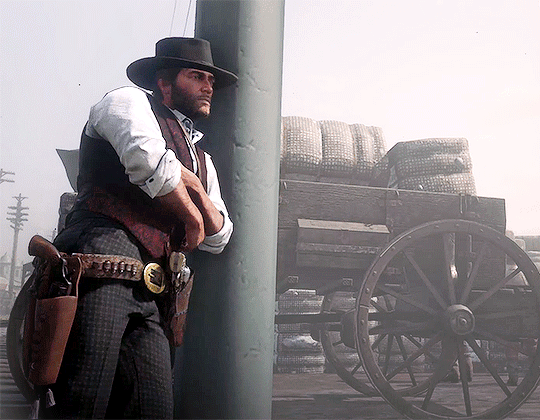
Read below the cut for the full essay! (BEWARE OF SPOILERS!)
The Gun-Slinging Hero
In a lot of ways, Arthur Morgan is a familiar hero. The Western isn’t necessarily a story about cowboys. It is, however, necessarily a story of the gunslinger. Whether he be a sheriff, a Robin Hood-esque outlaw, or a cowboy, he is nevertheless a skilled shootist, often working alone, and pitted against unequivocally bad guys. The anti-Western (a subgrenre of classic hollywood films which emerge earliest in the 60s) somewhat turn this trope of the unfailingly good gunslinger on its head by instead critiquing this lone figure as troubled, haunted by a past, and unable to survive in a society structured by morals and laws. In short, the Western does not question the gunslinger’s ability to leave behind a trail of bodies. I would go so far as to say that the Western refuses to look at this trail of bodies. The anti-Western, however, will constantly remind the hero of their body count as one of the many flaws which make them tragic.
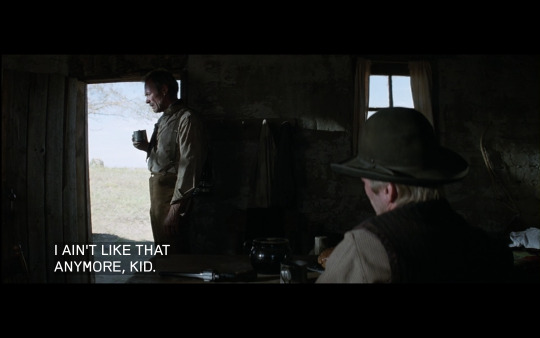
Clint Eastwood as Will Munny in the anti-Western, Unforgiven (1992). Will Munny is a reformed outlaw and widower who is trying to make ends meet as a hog farmer. A cowboy, fascinated by stories of his past, asks him to join him on the hunt for a $1000 bounty, to which Will responds, ‘I ain’t like that anymore, kid.’
In this regard, Arthur Morgan isn’t all that far-off from a very familiar figure in cinematic history. He is a skilled gunslinger with a body count. He lets everyone know he’s a bad person and frequently contemplates the sins of his past. Yet, he differs in drastically different ways too. To begin with, this haunted gunslinger trope is often running away not just from his past but from the death of, typically, a family member, especially a wife or a lover. Due to the death of this loved one, the anti-Western hero is emotionally closed off and melancholy in disposition. Clint Eastwood is famous for portraying this type of cowboy, whose film posters and iconic performances center on the grimacing cowboy unfazed by the monstrosities committed by himself and others.
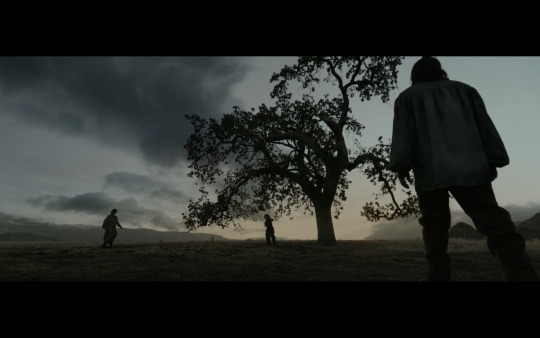
In the Revenant (2015), frontiersman Hugh Glass is haunted by his dead wife and son, who are members of the Pawnee tribe. Note that the trope of the tortured widower is condensed with surreal representations of colonial settler violence, thereby mixing the personal tragedy of losing family with the more historical problem of genocide and Western expansion.
The framing of Arthur Morgan, strangely enough, both embraces and rejects this trope. As we play Red Dead Redemption 2, we learn that Arthur has an unrequited love with the widow Mary Linton, whom he almost married once but ultimately let go, despite his persisting feelings for her, out of fear for her safety and wellbeing. Thus, Mary Linton is spared becoming the collateral for Arthur’s moral reformation. She lives, and her rejection of his lifestyle is all the reminder he needs that he hasn’t done good things in his life.
On the other hand, we have the deaths of Eliza and Isaac. I know this is going to be controversial (considering the ambiguity of Eliza’s relationship with Arthur and how the fandom likes to interpret her as a ‘dead wife’ figure for Arthur). It’s worth noting that, in his conversation with Rains Fall and Sister Calderón, Arthur doesn’t really think of Eliza as a wife he lost (he only regrets letting go of Mary aka ‘a woman who loved me’). They very explicitly never married, as he didn’t want to make promises he couldn’t keep (a paraphrase of his own words), but he otherwise thought of her as ‘a good kid,’ having only been 19 years old when she became pregnant with their son. By all accounts, I think the real tragedy and ghost of Arthur’s past is Isaac himself, with Eliza being somewhat of a friend or co-parent whose death he also regrets.
Yet is exactly on this point that Arthur differs. The deaths of his son and co-parent have done nothing to his otherwise happy-go-lucky attitude, or the excitement he feels when robbing a train [credit to @f--hawk for finding out via mods that he smirks beneath the bandana during the train robbery mission cutscene]. Neither do these deaths motivate him to leave the outlaw lifestyle, as it did for aforementioned character Will Munny in the film Unforgiven. Whatever moral reformation Arthur experiences as a result of this trauma does not manifest outwardly, but it doesn’t stop him from living his life either. As such, Arthur Morgan occupies this liminal space between the Western hero and the Anti-Western hero, neither heroic nor fallen; not widowed but still grieving; cognizant of the weight of his actions yet constantly living in the present.
This in-between-ness actually makes a good beginning for a video game protagonist, as it’s precisely this ambiguity that gives the player freedom to decide how Arthur develops. In this sense, Arthur is already more accessible than his cinematic predecessors. Loss is a memory, not an anchor, and players are free to contemplate how his actions will affect him rather than a predetermined path. (Though there’s an argument to be made that the game definitely wants players to choose the path of redemption for Arthur).
In a lot of ways, the writing of Arthur Morgan as a character is a wholesale rejection of the emotionally closed-off, brooding, and fallen hero archetype that so frequently graces the Western genre. As one of the characters mention, Arthur is always smiling. He is prone to self-deprecating humor and lighthearted banter. His responses to shit going down are the type of lines you’d normally hear from the mouth of a comic side relief in films [for instance, his sarcastic remark after trying to escape the trolley, ‘Does this trolley go to Tahiti?’ is an example of his surprisingly bombastic and humorous disposition].
More importantly, he laughs -- heartily and frequently. Clint Eastwood might smirk. John Wayne might flash a smug grin. But Arthur Morgan smiles with his whole heart and inflects every chortle with emotion. Just hear this bellowing laughter of his when he wins 36 cents in a game of blackjack.
Below, you’ll find a clip of Arthur being a vocal supporter of the theatrical arts:
youtube
In short, Arthur isn’t defined by his pain, neither does the narrative of Red Dead flaunt the sins of his past constantly through dialogue and imagery. There’s a purpose behind all this, of course. It makes Arthur’s willingness to help out complete strangers, even at his own expense, more plausible due to his easygoing and helpful nature. If, as sister Calderon says, helping people makes him smile, then it’s more believable for us as the audience and the player to see Arthur Morgan as a complicated individual whose cheerful disposition adds nuance to a tried-and-tested cinematic archetype.
Romancing the Cowboy
Okay, so far Arthur Morgan is unconventional, for sure, but how is he more appealing to a 21st-century audience? There are signposts throughout the game and Arthur’s writing which suggest that the writers behind Red Dead 2 wanted to appeal to a broader audience than the traditional consumers of Westerns. In other words, the presence of certain tropes and imagery show that the developers were trying to appeal to so many more people than just the cis white man. Given how handsome Arthur is, women for sure is one of those newer groups brought into the Western fold. [Note, by ‘women’ I don’t just mean cis straight women either. I would further argue that Arthur has a universal charm that members of the LGBTQA community and people of color can rally behind, being a bisexual woman of color myself]
To open up the Western and reimagine the broody gunslinger, Red Dead 2 introduces two genres into the series, which shape Arthur as a heartthrob and alluringly sensitive soul: the Medieval Romance and Romanticism.
The Medieval Romance
The medieval romance is an old and varied genre that is difficult to pinpoint. Not to mention, the genre changes depending on the region and language we’re focusing on. For our purposes, the medieval romance is a type of fictional narrative. Structurally, these narratives are episodic and prominently feature chivalry/chivalric duty, knights, adventure, and courtly love. Many might be familiar with King Arthur and the Knights of the Round Table, aka the Arthurian legend. In the romance version of this myth (i.e. not the Welsh folklore but the English textual co-optation of the legend), the knights of the round table often go off in their own tales of adventure, with each tale serving as an episode that takes the heroes to different locations and challenges.
Is this beginning to sound familiar? Red Dead Redemption ostensibly follows this bare bones structure of the medieval romance. There is a core group with a sovereign leader (Dutch, in this case) surrounded by his loyal outlaws who all abide by a code. Remember, chivalry isn’t just some outdated way to talk about being nice and courteous to women. Chivalry also represents the codes of loyalty a knight upholds as a representative and champion of his liege lord. Thus, it is very fitting for us to think of the Van Der Linde gang as a group of knights abiding by a certain code that, while not explicitly defined, hinges on loyalty and a sense of honor (or in their case, honor among thieves). In fact, even the camp life is reminiscent of courtly life, with fêtes, singing, and their own micropolitical squabbles. Another facet of chivalry is how a knight treats with noblewomen and ladies. A chivalrous knight is always ready to be at the call of his lady, coming to her rescue or championing her in tournaments. The romantic tropes that come from this gendered dynamic survives today as the knight-like readiness of Arthur to help women and always treat them with utmost respect -- something that not every man in the camp actually do *cough Micah and Duch cough*
More to the point (in terms of how this makes Arthur sexy), the medieval romance is most famous for portraying courtly love. Courtly love too is a vague term, but you can readily identify it as often a star-crossed romance between a lady and a knight. Often there is something preventing them from coming together, whether it be class difference (for instance, a Queen and her knight, like Guinevere and Lancelot) or war keeping the lovers away from each other. Courtly love is depicted in art as elevated, not merely a carnal or romantic arrangement. Court lovers are often depicted exchanging letters, or often a knight will perform life-threatening/valiant feats in order to prove his love and loyalty to his beloved.
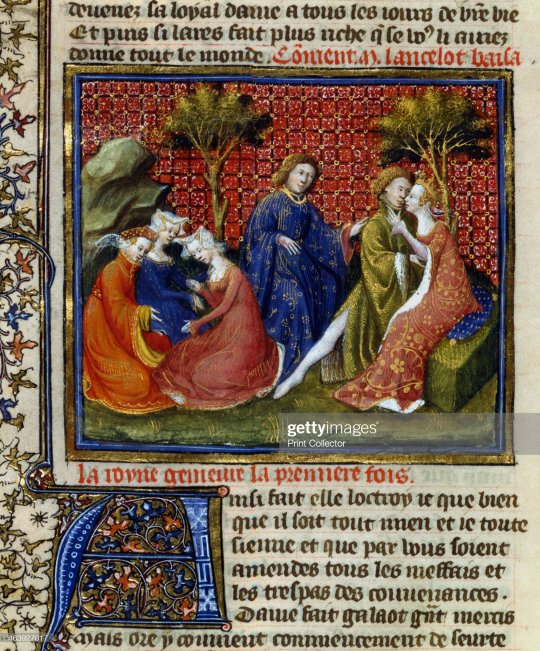
(Taken from La morte d’Arthur, this artwork shows King Arthur catching sight of his knight Lancelot embracing his wife Queen Guinevere. This love triangle is the quintessential doomed love affair in Western literature)
By now, I hope you’re starting to see some big motifs that are clearly at work in RDR2. Star-crossed lovers, elevated courtship, loyalty, tragedy, and circumstances preventing both lovers from being happy are staples of a rich literary tradition that informs our idea of romantic love in the modern world. More importantly, these tropes are blatantly present in Arthur Morgan as a loyal knight whose main point of narrative tension stems from the personal happiness of being with Mary Gillis vs fulfilling his duty as an outlaw loyal to Dutch and his ideology.
I would like to note that, whenever modern works invoke older literary forms, the effect tends to be elevatory. Notice how none of this is really a major theme in RDR1. We’re not supposed to imagine John as an adventuring knight caught in the highs and lows of criminal courtly life. John’s story is more reminiscent of the anti-Western. On the other hand, Arthur’s feats and tragic love story with Mary hearken back to these historical tales of timeless love and literally knights in shining armor. We’re supposed to think of Arthur as noble, in both senses of the world. In this vein, I don’t think it’s an accident that his very Welsh name of Arthur Morgan was chosen, considering how both Arthur and Morgan le Fay are major players in the Arthurian legend.
Note, it’s not an accident that, in the epilogue, 12-year-old Jack is telling his father about the legend of King Arthur and the knights of the round table. In a way, this is the game’s way of sublimating Arthur and his life into legend. He lived and died tragically, much like his namesake, and in the epilogue he continues to live on in legend, sublimated into fantastical tales for children who seek to be transported to other fictional worlds.
To summarize this subsection, the medieval romance is formally and thematically pervasive in RDR2, making it more unique among other Westerns and anti-Westerns. Arthur Morgan, as a character reminiscent of noble knights of legend, embodies the heroes of both medieval and modern romance.
Romanticism

Arthur contemplating life while sitting on the precipice of Horseshoe Overlook, VP by @papauue
Now, let’s talk about a relatively more modern artistic movement that actually has more overt connections to RDR2′s story and a genre famous for catering to sensitive souls and women.
Historically speaking, romanticism covers a lot, especially (from the German side of things) a movement of philosophy that is all about self-elevation/self-liberation, experiencing the sublime, and encountering nature as an ambivalent yet powerful force that can inspire great transformation.
We won’t get into any of that, but we will get into Romanticism’s ramifications for late 18th-century/early 19th-century culture in Western Europe and North America. Romanticism is the moment of broody poets (Lord Byron, Mr. and Mrs. Shelley, William Blake, Coleridge, Wordsworth, etc), and in this moment we see a turn away from the cosmopolitan pretensions of the Enlightenment in Europe to the purifying retreat of nature and its aesthetic pleasures.
Visually, emphasis on the poet as a lone wanderer as an agent ready to submit to higher powers pervades art in this time. The famous painting by German Romantic, Caspar David Friedrich is a great example of the individual whose seclusion in the great abyss of nature inspires self-elevation.
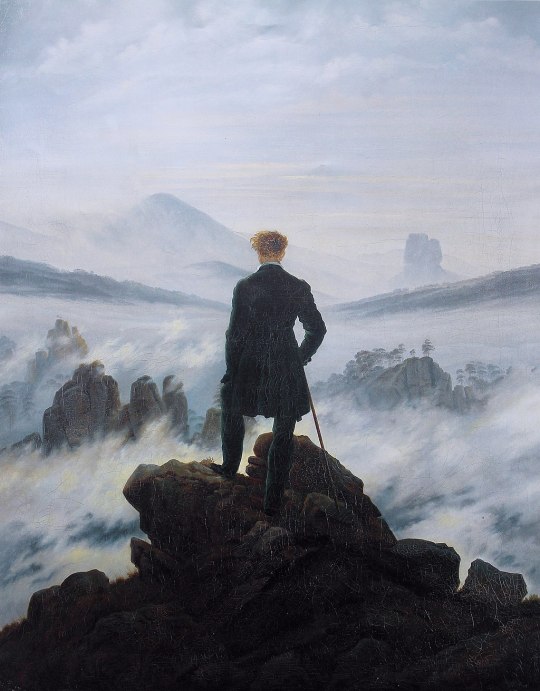
It always struck me as funny that, cinematography-wise, Red Dead Redemption 2 doesn’t really force shots like this in cutscenes, but the world building and design of RDR2′s open world for sure enables the player to likewise seek refuge and commune with the austere landscape of the North American wilderness. The screenshot below is one of my first screenshots from my first playthrough. The scenery honestly inspires the Romantic sublime, and I definitely think this was deliberate on the part of RDR2 writers and developers!
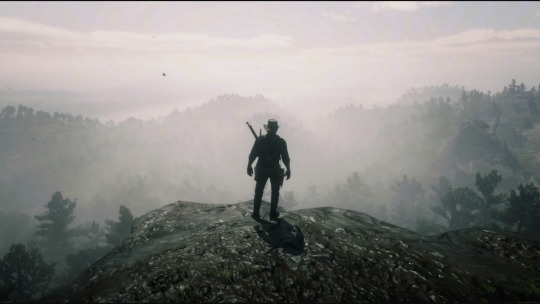
As you can imagine, the emphasis on landscape, self-liberation, freedom, and experiencing the world ‘through a grain of sand, eternity in an hour’ (from William Blake) works its way into RDR2 via Arthur’s journal. In a previous post of mine, you can get more of the history behind journaling and travel literature as a background on Arthur’s naturalist aspirations. But here, we’re going to talk about the act of journaling itself, i.e. the act of writing prose in a moment of self-reflection, as a byproduct of romanticism and the wandering poet.
Though journaling became a more popular activity in the 1700s, especially with the rise of epistolary fiction and novels, it became more commonplace and standard in the 1800s. The quote below briefly sums up what journaling was used for in this time period:
“Nonfictional narratives of the disease—in texts ranging from diaries and memoirs to medical publications and political debates—were equally central in efforts to make sense of life, illness, and death in the nineteenth century.” - The Making of Social Disease by David S. Barnes
Journaling therefore is an activity of moral development and sensitive self-reflection. The journal is all about making a text to make sense of one’s life and experiences, and often these attempts reflect how nonsensical the world actually is. We definitely get this tone and struggle in Arthur Morgan’s journal, who often writes in his entries that he is at a loss as each failure brings the gang closer to their demise. This writerly, if not poetic, disposition in Arthur shows he is a brooding, sensitive soul beneath that facade of tough and smart-ass cowboy.
But there’s more to Romanticism in Red Dead 2 than landscape. Perhaps the most famous cultural byproduct of Romanticism is the popularity of consumption (i.e. pulmonary tuberculosis) as an aesthetic that makes one more attractive and sensitive.
I am not kidding. There is a great article about the history of consumption as sexy. I recommend this article here for a light and quick read on the subject.
To pull a quote from the article, let me sum up how consumption was seen as sexy in this time period:
“Because of its association with young women and poets, the disease itself came to represent beauty, romantic passion, and hyper sexuality. As far as illnesses went, it was considered to be rather glamorous, and in a culture half in love with death, it inspired its fair share of tributes. There are numerous romantic depictions of young women wasting away in death beds at the height of their beauty.” (from “Drop Dead Gorgeous”)
In addition to aesthetic, David S. Barnes (from the quote above) notes that the consumptive also embodies an idealized path toward self-redemption:
"Briefly stated, tuberculosis served as a key vehicle in the nineteenth century through which womanhood was associated with a kind of suffering that was morally and spiritually redeeming. Moreover, around the turn of the century, even as the French state and the medical and philanthropic communities were elaborating and actively promoting a new vision of tuberculosis as a social problem of the first magnitude, the older reading of the disease as a sign of redemptive suffering persisted and even thrived, in a sense complementing but also implicitly contesting the new sociomedical orthodoxy." (Barnes)
Although the figure of the sexy consumptive typically was a woman, as these historians will tell you, many men -- especially poets and artists -- were considered sexy for having the look of a consumptive. Their emotional outbursts, pale and lean builds, and tendency to die before they’re 30 made them highly appealing and romanticized in an era that was a little too fascinated with death.
Morbid as it is, the figure of the consumptive is where we get these Victorian beauty standards of pale skin, leanness/thinness, rouged cheeks and lips (from the bloody coughs), and artistic sensibility! In literature and art, the ailing consumptive also had a special relationship with nature, as treatment often required they stay in the country for recovery. As such, these consumptive souls were often seen as pure, sensitive, and mellow individuals who are above the earthly concerns of the city.
The aesthetic of the sexy consumptive survives today in vampire literature, as a romance subgenre that plays with the historical monster as an eternally youthful yet morally damned/tortured lover. So, even though this fetishizing of consumption back in the 1800s might come off as morbid and twisted to modern audiences, the cultural impact of romanticism remains with us today, albeit in other mutated forms.
Now, I set up all this historical context to talk about this big plot event in the story of Red Dead Redemption 2: Arthur contracts tuberculosis.
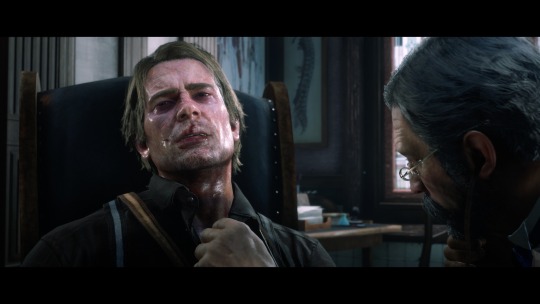
In the tragic conclusion of Arthur’s story, Arthur’s tuberculosis manifests after a rough fifth chapter, and the symptoms become flagrant: pale skin, bloodshot eyes, coughing up blood, fainting, inability to maintain weight, etc-- the supposed traits of the sexy consumption. Now, I don’t think it’s Rockstar’s intention to portray a sick and dying Arthur as sexy, but I do think that in giving him a disease that became less common in 1899 (it was scarier and more prevalent as a disease in the earlier half of the 1800s) is their way of elevating Arthur up as a Romantic Hero. His sensitivity as an artist and ailing health ascribe to him the aesthetic disposition of a poet and a Romantic. Like the beautiful tragic poets of the prior century, Arthur is now on this doomed trajectory toward redemption and self-liberation.
In a way, the consumptive also socially elevates Arthur. Consumption is typically the disease of the rich in 19th-century popular culture. Poets, artists, and repressed daughters of rich families were the more visible victims of this beautifying illness.
I’m not sure if I am still making sense here. And if anyone has questions or confused, I am totally happy to clarify whenever yall want. Basically though, the invocation of Romanticism as a genre in Red Dead 2 is all about making Arthur a Romantic hero whose relationship with nature isn’t so much just one of an outlaw’s but also one of a sensitive soul, whose curious mind leads to moments of pensive self-reflection and contemplations on life and death.
Miscellany and Conclusion
There are other elements that make Arthur an attractive hero for all, detracting from the typical masculine archetypes found in a Western. One thing I couldn’t really classify is Arthur’s compassion toward animals. The soft, breathy whispered “thank you” he gives to his dying horse in his final mission is one such example, but ultimately you’ll find a line of dialogue every once in a while that shows Arthur has a serious respect for animals, if not a soft spot for them. Albert Mason’s photography side missions are proof and point of this tendency in him.
I also don’t want to understate how Arthur, as a talented artist and writer, contributes to his sex appeal as a modern protagonist. Most cowboys in both the Western and anti-Western aren’t artists. In fact, I can’t think of a cowboy who just sketches by his lonesome while out in the wilderness. This attention to landscape and animals in their natural habitat, while explained in my aforementioned post, show a side of him that values the precious yet fragile beauty of nature. It’s sexy for a man to be so earnest in his relationship with the world, forever willing to learn and to appreciate his surroundings. Most cowboys/gunslingers are tamers of the natural world, but Arthur is most decidedly a courteous guest of nature doing his best to respect wildlife while surviving.
In the end, Arthur is a combination of past literary traditions, but such a masterful combination of old form means he is readily recognizable and appealing, because older genres always survive, in some form or fashion, in our modern world. The consumptive Romantic is now the sexy, sensitive vampire. The knight of medieval romance is now the kind man who champions his love via devotion and respect. Arthur Morgan is a critique of the Western’s moral failings, but he is also an enthusiastic rejection of the fraught and emotionally closed-off embodiment of the hypermasculine. He doesn’t just survive -- he lives in the world as a writer, artist, and gentle soul. It is through these combinations that Rockstar can repackage the Western and give us a beautiful and beloved hero like Arthur Morgan.
295 notes
·
View notes
Text
Fic: About the Bass (Keanu x F!Reader)

Summary: seeing Keanu playing the bass is one of the hottest things you’ve witnessed.
Pairing: Keanu x F!Reader
Author’s notes: do I really need to say how much I love Keanu playing the bass? It’s one of my kinks and this definitely is a product of that. Feedback is very welcome!
Wordcount: 1702
Warnings: mentions of alcohol and age gap.
You moved through the small gathering of people, a margarita in your hand – your third and last of the night – offering smiles and pausing to chat. It was your birthday and everyone seemed to be trying to speak to you, which was certainly lovely. You liked the attention, but you couldn’t help the disappointment burning in your chest.
You hadn’t expected to be thrown a surprise party. You were pretty sure you actively said to your younger sister that you didn’t really want to make a big deal out of it. To you, turning thirty was just like any other year. But apparently, she was incapable of listening, because she planned the entire thing and roped Keanu into not only helping to make sure you were kept in the dark but also into opening his house to a bunch of strangers.
You were going to have some words with her about it because she shouldn’t have asked that of Keanu. The two of you had only been friends for a few months, ever since Company Films hired you to work on a few scripts they were producing. You knew how much he valued his privacy. His house should have been off-limits.
Thankfully, the party was finally winding down. Happy Birthday had been sung, the cake had been cut and guests were finally leaving, saying their goodbyes to you, before slipping out. Looking around the small crowd of people that still lingered, you tried to catch a glimpse of his dark hair, but he didn’t seem to be around.
You excused yourself from one of your friends and wandered around the unfamiliar hallways until you found him in the music room, eyes closed, headphones on as he played a silent tune on his bass. You leaned against the frame to watch him, the way his long fingers moved over the strings so expertly; the little from of concentration and how he bobbed his head to the tune only he could hear. You had to smile because he looked both adorable and unbelievably attractive like that.
You realized you had a major crush on Keanu probably after the second week of working with him, doctoring the script for the next movie he would be directing. He was funny and sweet and so brilliant. It was next to impossible not to be smitten by him.
You convinced yourself it was stupid and hopeless because he was technically your boss and so much older than you. Not that you really cared about that, but you knew the press would buzz about it and besides, there was no way he would be interested, right?
Or so you thought until you started noticing all the little things. The glances whenever Keanu thought you weren’t looking; the way he smiled at you, soft and gentle, his entire facing lighting up and creases marking around his eyes. The little gestures whenever you were working together; like bringing you coffee when you didn’t even realize you needed or always ordering your favorite takeouts, even if he didn’t particularly care for it…
Part of you still wondered if you weren’t reading too much in this. You knew he was one of the sweetest, nicest guys in Hollywood. Maybe he was just being the perfect gentleman. But those things still planted the seed of hope in your chest. As a matter of fact, when he invited you for dinner and a movie to celebrate your birthday tonight you were planning on talking to him, checking where you both stood, but the surprise party really crashed your plans.
“Hey. How long have you been standing there?”
Keanu’s voice startled you back from your musings and your gaze focused on him again, noticing he had stopped playing and stood there with his headphones around his neck, a flush on his cheeks and a sheepish smile on his lips.
“Not long,” you replied with a smile of your own and stepped into the room. “I just wanted to let you know that people are starting to leave. You should have your house back in an hour or so. By the way, you really shouldn’t have let my sister get you into this.”
“It’s fine,” he shrugged, that soft smile adorning his lips and your heart fluttered. “Sorry I disappeared, it’s just…”
“Too much people start getting on your nerves?” you asked and Keanu chuckled, nodding. “Yeah, me too. Anyway, whatever you were playing, it looked good.”
“Well it sounded terrible,” he said with a small grimace, ducking his head self-consciously. “I’m rusty. It’s been a while since I played.”
“You miss it? Dogstar and Becky?” You leaned against the arms of one of the armchairs.
“Sometimes,” he shrugged, starting to pull off the strap of the bass.
“Wait. Play me something,” you requested and Keanu snorted, shaking his head.
“I wasn’t kidding when I said I’m rusty.”
“Oh, come on! It’s my birthday.” You pouted at him, knowing very well he never resisted long. “Pretty, pretty please?”
“How about I teach you instead?” he offered and you nodded.
“But I have to warn you, I’m tone-deaf,” you commented as he removed the headphones and connected the bass to a speaker.
You moved to stand in front of him when he beckoned you. Keanu settled the strap of the bass on your shoulder before he adjusted the length so the red body of the bass hung at your hips.
“How’s that? Should I shorten it a little more?” he asked moving behind you and settling his hands over yours.
There were so many thoughts running through your head at once but at the same time, you seemed completely unable to focus on any of them. Your entire body was intuned to Keanu’s and as he came closer, you were engulfed by the flow of sensations.
“It’s… uh… fine,” you stuttered.
“Good thing you’re a leftie too. Gonna make this easier.”
His left hand guided yours to the neck of the bass, adjusting your fingers at the right position, pressing them against the strings. You could feel the old callouses on the pad of his fingers, speaking of a lifetime of working with his hands, be it by playing instruments, working out or handling fake guns, it all left its toll on his hands.
The sensation was foreign but not unwelcome, just like you welcomed the warmth of his palm and how large it was, something you had always noticed, but seeing it covering yours like this was making your throat dry and sending very bad thoughts flying through your brain.
Of course, you knew Keanu was a big man. It was impossible not to notice. He was tall, with broad shoulders, strong chest and long limbs. You felt tiny in comparison and more than once you wondered how it would feel to be surrounded by his warm embrace like you were having a chance to experience just now.
“This is an A,” Keanu said, strumming the strings with his pick.
His words ghosted against your cheek and you caught a whiff the alcohol in his breath and it was strangely addictive. You could feel the warmth of his body and smell his cologne. It was wooden and spicy, with an underlying musk that you knew it must be Keanu’s unique scent and it was making your head spin.
You didn’t know if this was the best or worst idea the two of you ever had because it almost felt like sweet torture to be this close. He moved your fingers against the strings, showing you another chord, but all you could focus was at the feel of his hard chest against your back; his strong arms around you; those long, nimble fingers over yours.
“Am I boring you?” Keanu asked, his baritone against your ear sending shivers down your spine and there was no way he didn’t feel that. “Maybe we should stop.”
“No,” you breathed out, tilting your head up to look at him, catching on his darkened eyes and the way he licked his lips as he stared down at you. You felt heat rushing through you, arousal and alcohol making you dizzy.
There was no denying now; no pretending that it was just your imagination. Not when Keanu was looking at you like he wanted to devour you whole and all you could think was having his mouth on you.
“This is a bad idea…” he whispered but guiding you with his hands to turn around and face him.
“Probably,” you sighed, letting go of the bass to rest your hands against his chest, looking into his eyes. “But sometimes the best things come from the worst ideas.”
The air felt thick with tension, the silence heavy with so many unspoken things as Keanu just stared at you and you wondered what his next step would be. It felt like it was happening in slow motion, the way he leaned closer, his hand coming to cradle your nape, tilting your face up at just the right way so you could properly welcome his mouth on yours. His lips slightly chapped against your soft ones, fitting almost perfectly; his beard tickling your nose.
You let your lips part under his, welcoming his tongue, tasting the beer he had all night, mixed with the sweetness of the chocolate cake. It was delicious and you tried to press closer, chasing his taste, but before either of you could go any further, someone cleared their throat, making both of you jump startled and breaking the mood.
“Sorry to interrupt,” your sister said with an arched eyebrow and a smirk and you couldn’t help but glare. “A couple of people want to say goodbye.”
“Yeah,” you said, voice raspy like you have been in the desert for too long.
You untangled yourself from the bass strap and Keanu, stifling the pitiful sound threatening to spill from your throat at the sudden loss. Your eyes met him when you were backing away, and you could see all the want and need you felt yourself.
‘Later,’ You mouthed at him and Keanu smiled, giving you a quick nod, before turning his back to you so he could put his bass away.
xxx
Permanent Tag List (check my bio to add yourself)
@toomanystoriessolittletime @meetmeinthematinee @theolsdalova @krazycags01 @beyond-antares @cumberbatchbaps @sgt-morgan @futuristic-imbecile @howtoruin-someones-perfect-day @a-really-bi-girl @fanficsrusz @nonsensicalobsessions @poisonedjoinery @soarocks @penwieldingdreamer @alwaydreamingofu @partypoison00 @hnryycvll @kevia1000 @reid-187 @shellbilee @ivvitm1109 @eevee-of-rivia @mis-lil-red
159 notes
·
View notes
Text
148. the coo-coo nut grove (1936)
release date: november 28th, 1936
series: merrie melodies
director: friz freleng
starring: peter lind hayes (ben birdie), bernice hansell (dionne quintuplets), tedd pierce (w.c. squeals), danny webb (walter windpipe), the rhythmettes, verna dean (additional voices)
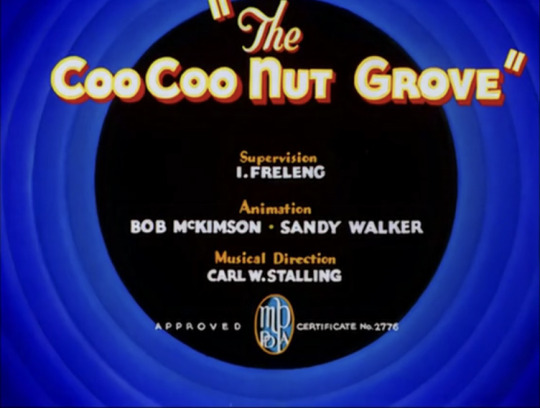
the cartoon that caused katherine hepburn to watch it 4 times and clark gable twice. an amalgamation of celebrity caricatures, designs courtesy of the great t. hee. see laurel and hardy share a drink, clark gable flap his ears to the beat of edna may oliver’s dancing, w.c. fields (squeals) flirt with katherine heartburn hepburn, and so on.
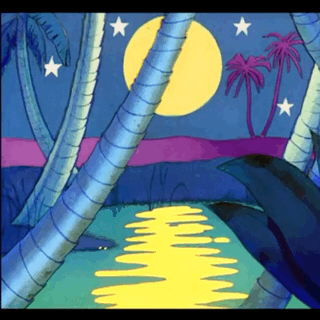
a parody of the famed hollywood nightclub the cocoanut grove, we open to a beautiful overlayed pan of the coo-coo nut grove, a nightclub literally nestled in a cluster of coconut trees. the backgrounds are wonderfully stylistic and sharp—not quite art deco, but the same “newness” that page miss glory exuded so well. a zoom in reveals that the red blinking neon light advertising the nightclub is lit up by fireflies, an oldie but goodie.
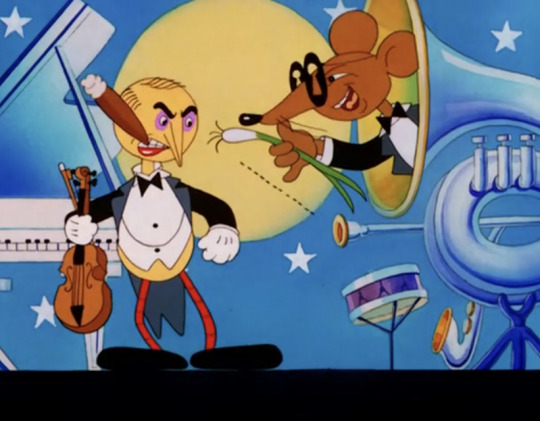
arriving to the nightclub itself, we iris in on ben birdie, a caricature of radio personality ben bernie. while he’s giving his trademark catchphrases such as “yowza!”, a mouse caricature of journalist walter winchell pops out of a tuba, holding out a scallion for birdie. “flash! an orchid for you, old mousetrap, from your old pal walter windpipe!” birdie takes care of the pest by blowing into the mouthpiece of the tuba, propelling windpipe across the nightclub. bernie and winchell had a good relationship off the set, but assumed the rules of enemies on bernie’s show. side note, danny webb voices the winchell mouse—he’d go on to provide some background voices for a few 30s shorts, as well as voicing egghead (actually egghead, not elmer!) in daffy duck and egghead.
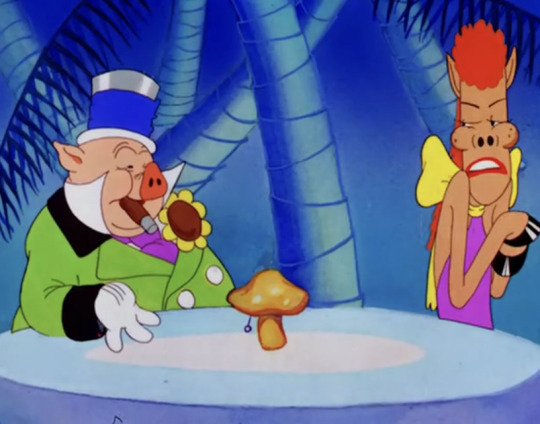
while birdie comments that it’s an ill wind, an ill wind, yowza, we get a good look of the patrons in the crowd. comedian hugh hubert is the first celebrity, who giggles and claps, bashfully averting his gaze. as a daffy duck aficionado, i owe a lot to hubert—he’s the one they voiced daffy’s trademark laugh after. thanks, hugh! the table next to him features w.c. squeals and katherine “heartburn” (an obvious play on hepburn.) squeals admires what a beautiful hand she has, promoting her to repeat the boulevardier from the bronx cackle bashfully before glaring at him in disgust. the laugh is more fitting as a horse, for sure! hepburn would be subject to MANY, MANY references in looney tunes shorts, primarily by tex avery. every time you hear a woman say something like “really it is,” that’s a hepburn impression.

next table over features a crotchety ned sparks, groveling “i go everywhere, i do everything, and i never have any fun.” sparks’ shtick was always playing a miserable, deadpan character. pan up to the coconut treetops (these backgrounds are absolutely gorgeous), where johnny weissmuller is pouring his wife and vedette lupe vélez a glass of wine. i love the bow tie tacked on to his tarzan garb, wonderfully tacky. instead of offering the glass, weissmuller downs it all in one go, beating his chest and doing the tarzan yell that buddy did in buddy of the apes. how i don’t miss you! i’m sure it’s implied, but weissmuller was the original tarzan. even more interesting, he was a gold medal olympic swimmer back in the 20s.
ben birdie introduces “the profile of profiling”, and thus sparks this lovely gag of john barrymore walking through the nightclub, his head at profile. no matter which way his body turns, his head is always at profile. eventually, his head is turned 180 degrees backwards as he sits down at a table. if you look him up, you’ll find that many of his headshots are profiles.
elsewhere, we spot a panicked woman running from some unknown threat. her face is concealed, so we’re unaware as to what caricature she is, but we DO know her pursuer: a bird caricature of harpo marx, galloping behind her and honking a horn. his hat opens to reveal an extending stop sign, and harpo pretends to pull the brakes. the sign switches to go, and harpo shifts back into gear, resuming his galloping routine. the animation is flighty, loose, hilarious, and ridiculous.
back to ben birdie, who moves things along. “and now, let us indulge to a bit of the light fantastic, etcetera, etcetera.” almost immediately, a crowd of couples get up to dance. it seems to me that the animation was reused from another freleng cartoon, i’m a big shot now. cut to another couple in particular, a turtle george arliss and bird mae west. a great pair, seeing as mae west was essentially a sex symbol, and george arliss was much older, being 68 as of 1936. very smooth and fun animation, topped off with west affirming “keep up the good work.”
another warner bros favorite to caricature—laurel and hardy. if my memory serves me correctly, this is the first time we see hardy caricatured as a pig. in many a cartoon, he’d be portrayed as such, often mimicked by porky. these include (but are not limited to) the case of the stuttering pig, you ought to be in pictures (a freleng classic), and the timid toreador. hardy grabs a coconut and signals for laurel to share. they both put their straws in the coconut and drink, and essentially swap themselves. hardy substantially loses weight and turns into laurel, whereas laurel gains substantial weight and turns into hardy. very clever.
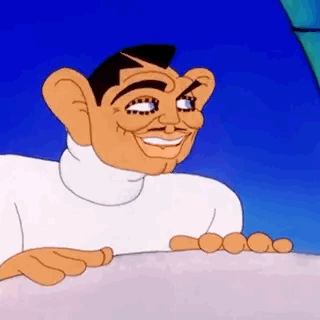
the next act features edna may oliver, who does an elaborate dance routine to “the lady in red”. clark gable in the audience is particularly entranced, flapping his ears to the music (another gable caricature staple.) leon schlesinger himself said after the cartoon’s release, “gable [came to see the film] at least twice, mesmerized by the rhythmic waving of his own ears. that ought to answer any questions about can hollywood stars take it.” schlesinger kept close tabs on who came to see his films, which only makes sense: he worked at chicago’s colonial theater in 1908, keeping an autograph book of all the stars who would happen to visit. during oliver’s dance number, a lanky, rubber hose limbed gary cooper struts through the nightclub, doing his walk that he would feature in many of his cartoons. a trio of monkeys observe from the treetops, one of them declaring “he’s pixilated!”

next dance number is none other than the dionne quintuplets, voiced by (who else?) berneice hansell, singing a medley of “our old man” and “what’s the matter with father”. hansell’s voice talents are lovely and hilarious as always, and there’s a great little dance interlude as the quints turn around and tap their feet with their butts in the air. just in case you forgot they were babies! by this time, the quintuplets, only 2 years old, already had a movie made about them in early 1936 called “the country doctor”.
back to johnny weissmuller and lupe vélez, who are applauding the act from the treetops. a great scene as weissmuller spots a mouse skittering right by their table and shrieks. the great, mighty tarzan faints at the sight, and vélez instead does her own tarzan cry, grabbing her cowardly husband and swinging across a vine as the mouse skitters under the table.

back to the mysterious running woman pursued by harpo marx. harpo tackles her, and the woman finally reveals herself to be none other than groucho marx! this gag would be much more notably reused in tex avery’s *hollywood steps out, with clark gable pursuing groucho instead of harpo. i like the inclusion of harpo, it makes the reveal all the more disturbing. harpo, appalled, dashes out of the nightclub while groucho grins.
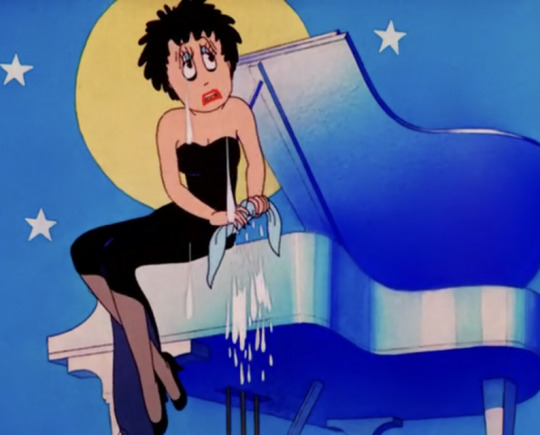
the next scene is a more somber mood. teardrops rain on the grass, and a slow pan reveals a tearful helen morgan singing “the little things you used to do”, perched on a piano and wringing a handkerchief. the animation is quite good, with lots subtle head tilts. wallace beery is particularly moved by the music. so moved, in fact, that he grabs a nearby banana hanging from a bunch, squirts out a line on a butter knife like a line of toothpaste, and shoves the knife in his mouth to cope with his heart strings being pulled. harpo marx is also moved, using a windshield wiper from his multipurpose hat to wipe away his tears. edward g. robinson and george raft aren’t particularly moved, chuffing on a cigar and flipping a coin respectively. that is, until, they both break down in sobs and embrace each other—a great mood change and great way to totally shatter the “tough guy” act. i believe raft was also caricatured in ali-baba bound as flipping a coin with his foot (eugh).

now, the nightclub is totally afloat, caricatures sitting on their tables as the ground is submerged in tears. slowly, the tables begin to drift away in the current, with the george arliss turtle rowing along, using his shell as a boat. and with that, ben birdie signs off.
while this cartoon is dated, sure, i think it’s a cartoon you can enjoy, regardless if you understand the references or not. i certainly didn’t know a good 35% of the caricatures, and had to look them up. but i truly believe that’s part of the fun of it though, and that’s why i love these caricature-centric shorts. you get to explore and really get hands on, you get to research, you get to learn something new. i sure didn’t know that george arliss was born in 1868, and i find that fascinating! i didn’t know that ben bernie and walter winchell played enemies on bernie’s show, but now i do. it’s fascinating! and that’s in part why i love doing these reviews. no matter what, there is always something new to learn. and besides, if anything, you can laugh and admire how the caricatures are drawn, and the backgrounds are just superb. this is definitely a visual centric cartoon, and it constitutes a watch for that alone. i prefer hollywood steps out myself, but this is a good entry, especially for 1936. i say go for it!
link!
16 notes
·
View notes
Text
books I read in 2019 (not including rereads, favorites are bolded!)
Come Close - Sappho
Shanghai Baby - Wei Hui
Twenty Love Poems and a Song of Despair - Pablo Neruda
Bad Feminist: Essays - Roxane Gay
The Mother of Black Hollywood: A Memoir - Jenifer Lewis
Sula - Toni Morrison
Reinventing the Enemy’s Language: Contemporary Native Women’s Writings of North America - ed. Joy Harjo and Gloria Bird
How to Write an Autobiographical Novel - Alexander Chee
Night Sky With Exit Wounds - Ocean Vuong
If They Come For Us - Fatimah Asghar
Heart Berries: A Memoir - Terese Marie Mailhot
Less - Andrew Sean Greer
The Astonishing Color of After - Emily X.R. Pan
Goodbye, Vitamin - Rachel Khong
Darius the Great is Not Okay - Adib Khorram
Exit West - Mohsin Hamid
Homegirls and Handgrenades - Sonia Sanchez
Heavy: An American Memoir - Keise Laymon
All You Can Ever Know - Nicole Chung
Unaccustomed Earth - Jhumpa Lahiri
The Wife Between Us - Greer Hendricks and Sarah Pekkanen
The Way You Make Me Feel - Maureen Goo
A Very Large Expanse of Sea - Tahereh Mafi
Water By the Spoonful - Quiara Alegría Hudes
I Can’t Date Jesus: Love, Sex, Family, Race, and Other Reasons I’ve Put My Faith in Beyoncé - Michael Arceneaux
Bury It - Sam Sax
White Dancing Elephants - Chaya Bhuvaneswar
Pulp - Robin Talley
Shit is Real - Aisha Franz
Silencer - Marcus Wicker
Forget Sorrow: An Ancestral Tale - Belle Yang
Bestiary: Poems - Donika Kelly
Monster Portraits - Sofia Samatar
No Matter the Wreckage - Sarah Kay
Violet Energy Ingots - Hoa Nguyen
Olio - Tyehimba Jess
The Kane Chronicles: The Serpent’s Shadow - Rick Riordan
There Are More Beautiful Things Than Beyoncé - Morgan Parker
Nylon Road: A Graphic Memoir of Coming of Age in Iran - Parsua Bashi
The Wedding Date - Jasmine Guillory
Fruit of the Drunken Tree - Ingrid Rojas Contreras
An American Marriage - Tayari Jones
Family Trust - Kathy Wang
Not That Bad: Dispatches from Rape Culture - ed. Roxane Gay
Little & Lion - Brandy Colbert
A Girl Like That - Tanaz Bhathena
Suicide Club: A Novel About Living - Rachel Heng
The Disturbed Girl’s Dictionary - NoNieqa Ramos
My Old Faithful: Stories - Yang Huang
Crazy Rich Asians - Kevin Kwan
Girls Burn Brighter - Shobha Rao
Moon of the Crusted Snow - Waubgeshig Rice
Kingdom Animalia - Aracelis Girmay
Happiness - Aminatta Forna
Devotions - Mary Oliver
The Proposal - Jasmine Guillory
The Kiss Quotient - Helen Hoang
When Katie Met Cassidy - Camille Perri
Heads of the Colored People - Nafissa Thompson-Spires
Friday Black: Stories - Nana Kwame Adjei-Brenyah
The Word is Murder - Anthony Horowitz
Miles from Nowhere - Nami Mun
The Lost Ones - Sheena Kamal
All the Names They Used for God - Anjali Sachdeva
Confessions of the Fox - Jordy Rosenberg
Love, Loss, and What We Ate: A Memoir - Padma Lakshmi
On the Come Up - Angie Thomas
The Guernsey Literary and Potato Peel Pie Society - Mary Ann Shaffer and Annie Barrows
The Love & Lies of Rukhsana Ali - Sabina Khan
See What I Have Done - Sarah Schmitt
Convenience Store Woman - Sayaka Murata
I Am Not Your Perfect Mexican Daughter - Erika Sánchez
For Today I Am A Boy - Kim Fu
The Seven Husbands of Evelyn Hugo - Taylor Jenkins Reid
Conflict Resolution for Holy Beings - Joy Harjo
They Can’t Kill Us Until They Kill Us - Hanif Abdurraqib
Mongrels - Stephen Graham Jones
If Beale Street Could Talk - James Baldwin
Death of Innocence: The Story of the Hate Crime that Changed America - Mamie Till-Mobley and Christopher Benson
The Gilded Wolves - Roshani Chokshi
To All the Boys I’ve Loved Before - Jenny Han
The Perfect Nanny - Leila Slimani, translated by Sam Taylor
The Travelling Cat Chronicles - Hiro Arikawa, translated by Philip Gabriel
Things We Lost in the Fire - Mariana Enríquez, translated by Megan McDowell
Sunburn - Laura Lippman
The House of Impossible Beauties - Joseph Cassara
Freshwater - Akwaeke Emezi
A Private Life - Chen Ran, translated by John Howard-Gibbon
Invisible: The Forgotten Story of the Black Woman Lawyer Who Took Down America’s Most Powerful Mobster - Stephen L. Carter
Undead Girl Gang - Lily Anderson
They Both Die at the End - Adam Silvera
The Friend - Sigrid Nunez
Severance - Ling Ma
Tiny Crimes: Very Short Tales of Mystery & Murder - ed. Licoln Michel and Nadxieli Nieto
Mapping the Interior - Stephen Graham Jones
Give Me Some Truth - Eric Gansworth
How to Love a Jamaican - Alexia Arthurs
All of This is True - Lygia Day Peñaflor
Swimmer Among the Stars - Kanishk Tharoor
The Wicked + the Divine, Vol. 7: Mothering Invention - Kieron Gillen and Jamie McKelvie
This is Kind of an Epic Love Story - Kheryn Callender
Gingerbread - Helen Oyeyemi
Where the Dead Sit Talking - Brandon Hobson
The Ensemble - Aja Gabel
My Education - Susan Choi
More Happy than Not - Adam Silvera
Nobody Cares: Essays - Anne T. Donahue
Kiss and Tell: A Romantic Résumé, Ages 0 to 22 - Marinaomi
Oculus: Poems - Sally Wen Mao
Let’s Talk About Love - Claire Kann
History is All You Left Me - Adam Silvera
Opposite of Always - Justin A. Reynolds
The Crown Ain’t Worth Much - Hanif Abdurraqib
The Weight of Our Sky - Hanna Alkaf
If You See Me, Don’t Say Hi - Neel Patel
Girls of Paper and Fire - Natasha Ngan
What if It’s Us - Becky Albertalli and Adam Silvera
The Map of Salt and Stars - Jennifer Zeynab Joukhadar
October Mourning: A Song for Matthew Shepard - Lesléa Newman
The Big Smoke - Adrian Matejka
Dissolve - Sherwin Bitsui
The Woman Next Door - Yewande Omotoso
The Refugees - Viet Thanh Nguyen
White Tears - Hari Kunzru
Electric Arches - Eve Ewing
The Black Maria - Aracelis Girmay
Bloodchild and Other Stories - Octavia Butler
Soft Science - Franny Choi
The White Card - Claudia Rankine
Mad Honey Symposium - Sally Wen Mao
The Care and Feeding of Ravenously Hungry Girls - Anissa Gray
Next: New Poems - Lucille Clifton
The Marvelous Arithmetics of Distance: Poems 1987-1992 - Audre Lorde
Quilting the Black-Eyed Pea: Poems and Not Quite Poems - Nikki Giovanni
The Arab of the Future - Riad Sattouf
Ghosts in the Schoolyard: Racism and School Closings on Chicago’s South Side - Eve L. Ewing
Gruel - Bunkong Tuon
Marriage of a Thousand Lies - SJ Sindu
Parable of the Sower - Octavia Butler
Good Night, Willie Lee, I’ll See You in the Morning - Alice Walker
That Kind of Mother - Rumaan Alam
Erotic Stories for Punjabi Widows - Balli Kaur Jaswal
Hera Lindsay Bird - Hera Lindsay Bird
Queenie - Candice Carty-Williams
And Still I Rise - Maya Angelou
The Man Who Shot Out My Eye Is Dead - Chanelle Benz
Everyone Knows You Go Home - Natalia Sylvester
Naming Our Destiny: New and Selected Poems - June Jordan
The 100* Best African American Poems (*But I Cheated) - ed. Nikki Giovanni
The Haunting of Tram Car 015 - P. Djèlí Clark
Bury My Clothes - Roger Bonair-Agard
Selected Poems - Langston Hughes
Their Eyes Were Watching God - Zora Neale Hurston
Sonata Mulattica - Rita Dove
Winnie - Gwendolyn Brooks
Bicycles: Love Poems - Nikki Giovanni
The Black God’s Drums - P. Djèlí Clark
Kid Gloves: Nine Months of Careful Chaos - Lucy Knisley
Annie Allen - Gwendolyn Brooks
Parable of the Talents - Octavia Butler
After Disasters - Viet Dinh
Passing for Human: A Graphic Memoir - Liana Finck
Teeth - Aracelis Girmay
A Surprised Queenhood in the New Black Sun: The Life & Legacy of Gwendolyn Brooks - Angela Jackson
Peluda - Melissa Lozada-Oliva
A Map to the Next World - Joy Harjo
Magical Negro - Morgan Parker
Corpse Whale - dg nanouk okpik
Hawkeye: Volume 1 - Matt Fraction
Cenzontle - Marcelo Hernandez Castillo
Don’t Let Me Be Lonely: An American Lyric - Claudia Rankine
Selected Poems - Gwendolyn Brooks
She Had Some Horses - Joy Harjo
The BreakBeat Poets: New American Poetry in the Age of Hip-Hope - ed. Kevin Coval, Quraysh Ali Lansana, and Nate Marshall
Beyond Uhura: Star Trek and Other Memories - Nichelle Nichols
The Past and Other Things that Should Stay Buried - Shaun David Hutchinson
Difficult Women - Roxane Gay
The Woman Who Fell From the Sky - Joy Harjo
The Collected Schizophrenias: Essays - Esmé Weijun Wang
Go Ahead in the Rain: Notes to A Tribe Called Quest - Hanif Abdurraqib
The Frolic of the Beasts - Yukio Mishima
Hawkeye Omnibus - Matt Fraction
Good Talk: A Memoir in Conversations - Mira Jacob
Karamo: My Story of Embracing Purpose, Healing, and Hope - Karamo Brown
Tipping the Velvet - Sarah Waters
When My Brother Was an Aztec - Natalie Diaz
Toxic Flora: Poems - Kimiko Hahn
Virgin - Analicia Sotelo
Easy Prey - Catherine Lo
Laura Dean Keeps Breaking Up With Me - Mariko Tamaki and Rosemary Valero-O’Connell
Saints and Misfits - S.K. Ali
Intercepted - Alexa Martin
Love from A to Z - S.K. Ali
Gemini - Sonya Mukherjee
The Atlas of Reds and Blues - Devi S. Laskar
My Brother’s Husband Vol. II - Gengoroh Tagame
Black Queer Hoe - Britteney Black Rose Kapri
Internment - Samira Ahmed
Dothead: Poems - Amit Majmudar
With the Fire On High - Elizabeth Acevedo
Sabrina & Corina: Stories - Kali Fajardo-Anstine
Milk and Filth - Carmen Giménez Smith
The Key to Happily Ever After - Tif Marcelo
If You’re Out There - Katy Loutzenhiser
Farewell to Manzanar - Jeanne Wakatsuki Houston
New Poets of Native Nations - ed. Heid E. Erdrich
Bodymap: Poems - Leah Lakshmi Piepzna-Samarasinha
Wolf by Wolf - Ryan Graudin
Tell Me How It Ends - Valeria Luiselli
Born a Crime: Stories from a South African Childhood - Trevor Noah
Down and Across - Arvin Ahmadi
The Tradition - Jericho Brown
About Betty’s Boob - Vero Cazot and Julie Rocheleau
Fake It Till You Break It - Jenn P. Nguyen
Storm of Locusts - Rebecca Roanhorse
Silver Sparrow - Tayari Jones
Pride, Prejudice, and Other Flavors - Sonali Dev
Mongrel: Essays, Diatribes, Pranks - Justin Chin
When I Grow Up I Want To Be a List of Further Possibilities - Chen Chen
The New Testament - Jericho Brown
Fumbled - Alexa Martin
If It Makes You Happy - Claire Kann
Brave Face - Shaun David Hutchinson
Words in Deep Blue - Cath Crowley
Lost Children Archive - Valeria Luiselli
Care Work: Dreaming Disability Justice - Leah Lakshmi Piepzna-Samarasinha
We Were Eight Years in Power: An American Tragedy - Ta-Nehisi Coates
Anger is a Gift - Mark Oshiro
The Bride Test - Helen Hoang
Not Your Backup - C.B. Lee
Prelude to Bruise - Saeed Jones
The Night Wanderer: A Graphic Novel - Drew Hayden Taylor and Michael Wyatt
Naturally Tan - Tan France
Bloom - Kevin Panetta and Savanna Ganucheau
Like a Love Story - Abdi Nazemian
I’m Afraid of Men - Vivek Shraya
Juliet Takes a Breath - Gabby Rivera
On Earth We’re Briefly Gorgeous - Ocean Vuong
Let Me Hear a Rhyme - Tiffany D. Jackson
I Wanna Be Where You Are - Kristina Forest
Hurricane Season - Nicole Melleby
Split Tooth - Tanya Tagaq
Hungry Hearts: 13 Tales of Love and Food - ed. Elsie Chapman and Caroline Tung Richmond
The Night Tiger - Yangsze Choo
Long Live the Tribe of Fatherless Girls - T Kira Madden
Miracle Creek - Angie Kim
Ayesha at Last - Uzma Jalaluddin
Shout - Laurie Halse Anderson
The Breakbeat Poets Vol. 3: Halal if You Hear Me - ed. Fatimah Asghar and Safia Elhillo
The Tenth Muse - Catherine Chung
This Place: 150 Years Retold - various authors
Kings, Queens, and In-Betweens - Tanya Boteju
Midnight Chicken (& Other Recipes Worth Living For) - Ella Risbridger
Library of Small Catastrophes - Alison C. Rollins
Natalie Tan’s Book of Luck and Fortune - Roselle Lim
No Ashes in the Fire: Coming of Age Black and Free in America - Darnell L. Moore
The Book of Delights - Ross Gay
The 7 1/2 Deaths of Evelyn Hardcastle - Stuart Turton
Speak No Evil - Uzodinma Iweala
How We Fight White Supremacy - Akiba Solomon and Kenrya Rankin
A Love Story Starring My Dead Best Friend - Emily Horner
Here and Now and Then - Mike Chen
The Ghost Bride - Yangsze Choo
Red White and Royal Blue - Casey McQuiston
Becoming - Michelle Obama
The Wedding Party - Jasmine Guillory
Magic for Liars - Sarah Gailey
I’ll Be Gone in the Dark: One Woman’s Obsessive Search for the Golden State Killer - Michelle McNamara
Brain Fever - Kimiko Hahn
Life on Mars - Tracy K. Smith
Notebooks of a Chile Verde Smuggler - Juan Felipe Herrera
Catalog of Unabashed Gratitude - Ross Gay
Tentacle - Rita Indiana
Hapa Tales and Other Lies: A Memoir About the Mixed Race Hawai’i That I Never Knew - Sharon Chang
Loose Woman - Sandra Cisneros
Duende - Tracy K. Smith
Mostly Dead Things - Kristen Arnett
1919 - Eve L. Ewing
Why I’m No Longer Talking to White People About Race - Reni Eddo-Lodge
Negroland - Margo Jefferson
For Black Girls Like Me - Mariama J. Lockington
Super Extra Grande - Yoss
Home Remedies - Xuan Juliana Wang
You Can’t Touch My Hair: And Other Things I Still Have to Explain - Phoebe Robinson
An Anonymous Girl - Greer Hendricks and Sarah Pekkanen
The Abundance - Amit Majmudar
I Shall Not Be Moved - Maya Angelou
Helium - Rudy Francisco
Teaching My Mother to Give Birth - Warsan Shire
Tomie - Junji Ito
Everything’s Trash, But It’s Okay - Phoebe Robinson
This Time Will Be Different - Misa Sugiura
Junji Ito’s Cat Diary: Yon & Mu - Junji Ito
Stag’s Leap - Sharon Olds
Black Card - Chris L. Terry
It’s Not Like It’s A Secret - Misa Sugiura
Washington Black - Esi Edugyan
From Here To Eternity: Traveling the World to Find the Good Death - Caitlin Doughty
I’m Telling the Truth, But I’m Lying: Essays - Bassey Ikpi
A House of My Own: Stories from my Life - Sandra Cisneros
The Terrible - Yrsa Daley-Ward
The Black Tides of Heaven - JY Yang
The Red Threads of Fortune - JY Yang
Little Fish - Casey Plett
Trick Mirror: Reflections on Self-Delusion - Jia Tolentino
The Black Condition ft. Narcissus - Jayy Dodd
The Goldfinch - Donna Tartt
Dealing in Dreams - Lilliam Rivera
The Tiger Flu - Larissa Lai
The Island of Sea Women - Lisa See
America is Not the Heart - Elaine Castillo
Feel Free - Zadie Smith
Walking on the Ceiling - Aysegul Savas
My Time Among the Whites: Notes from an Unfinished Education - Jennine Capo Crucet
The Unpassing - Chia-Chia Lin
Maurice - E.M. Forster
Permanent Record - Mary H.K. Choi
The Downstairs Girl - Stacey Lee
Red Dust Road: An Autobiographical Journey - Jackie Kay
The Ungrateful Refugee: What Immigrants Never Tell You - Dina Nayeri
I Married My Best Friend to Shut My Parents Up - Naoko Kodama
Killers of the Flower Moon: The Osage Murders and the Birth of the FBI - David Grann
Ordinary Light - Tracy K. Smith
Cantoras - Carolina De Robertis
Brain on Fire: My Month of Madness - Susannah Cahalan
How to Be Remy Cameron - Julian Winters
The Marriage Clock - Zara Raheem
Moon: Letters, Maps, Poems - Jennifer S. Cheng
Where Reasons End - Yiyun Li
Pet - Akwaeke Emezi
Meddling Kids - Edgar Cantero
A Lucky Man - Jamel Brinkley
Maiden, Mother, Crone: Fantastical Trans Femmes - ed. Gwen Benaway
What is Obscenity? The Story of a Good for Nothing Artist and her Pussy - Rokudenashiko
The Umbrella Academy Vol. III: Hotel Oblivion - Gerard Way
Who Put This Song On? - Morgan Parker
The Souls of Yellow Folk: Essays - Wesley Yang
Wave - Sonali Deraniyagala
Love War Stories - Ivelisse Rodriguez
Baby Teeth - Zoje Stage
A Fortune for Your Disaster - Hanif Abdurraqib
Eyes Bottle Dark with a Mouthful of Flowers - Jake Skeets
Dear America: Notes of an Undocumented Citizen - Jose Antonio Vargas
The Marrow Thieves - Cherie Dimaline
Polite Society - Mahesh Rao
Patron Saints of Nothing - Randy Ribay
The Body Papers: A Memoir - Grace Talusan
A Woman is No Man - Etaf Rum
Travelers - Helon Habila
Trust Exercise - Susan Choi
The Silent Patient - Alex Michaelides
The Intuitionist - Colson Whitehead
A People’s History of Heaven - Mathangi Subramanian
The Buddha of Suburbia - Hanif Kureishi
This is Paradise: Stories - Kristiana Kahakauwila
Brood - Kimiko Hahn
Don’t Look Now - Daphne du Maurier
How We Fight for Our Lives - Saeed Jones
I Hope You Get This Message - Farah Naz Rishi
Unmarriageable - Soniah Kamal
Bad Endings - Carleigh Baker
The Water Dancer - Ta-Nehisi Coates
The Lady from the Black Lagoon: Hollywood Monsters and the Lost Legacy of Milicent Patrick - Mallory O’Meara
Shapes of Native Nonficton: Collected Essays by Contemporary Writers - ed. Elissa Washuta and Theresa Warburton
Harley Quinn: Breaking Glass - Mariko Tamaki
Even the Saints Audition - Rachel Jackson
Slay - Britney Morris
#NotYourPrincess: Voices of Native American Women - ed. Lisa Charleyboy and Mary Beth Leatherdale
The Starlet and the Spy - Ji-min Lee
North of Dawn - Nuruddin Farah
Daisy Jones & The Six - Taylor Jenkins Reid
The Drowning Boy’s Guide to Water - Cameron Barnett
They Called Us Enemy - George Takei
Dear Girls: Intimate Tales, Untold Secrets, and Advice for Living Your Best Life - Ali Wong
The Right Swipe - Alisha Rai
Full Disclosure - Camryn Garrett
Searching for Sylvie Lee - Jean Kwok
Gideon the Ninth - Tasmyn Muir
Stubborn Archivist - Yara Rodrigues Fowler
The Wicked + the Divine, Vol. 8: Old is the New New - Kieron Gillen and Jamie McKelvie
Never Grow Up - Jackie Chan
“All the Real Indians Died Off”: And 20 Other Myths About Native Americans - Roxanna Dunbar-Ortiz
In the Dream House - Carmen Maria Machado
Blame This on the Boogie - Rina Ayuyang
It - Stephen King
Sea Monsters - Chloe Aridjis
My Fate According to the Butterfly - Gail D. Villanueva
The Wicked + the Divine, Vol. 9: “Okay” - Kieron Gillen and Jamie McKelvie
The Deep - Rivers Solomon
I Hope We Choose Love: A Trans Girl’s Notes from the End of the World - Kai Cheng Thom
Mooncakes - Suzanne Walker
BTTM FDRS - Ezra Claytan Daniels and Ben Passmore
Hot Comb - Ebony Flowers
Notes from a Young Black Chef - Kwame Onwuachi
Bunny - Mona Awad
The Twisted Ones - T. Kingfisher
Shuri, Vol. 1: The Search for Black Panther - Nnedi Okorafor
I Was Their American Dream: A Graphic Memoir - Malaka Gharib
Thick: And Other Essays - Tressie McMillan Cottom
Royal Holiday - Jasmine Guillory
Boxers - Gene Luen Yang
Saints - Gene Luen Yang
Fox 8 - George Saunders
The Memory Police - Yoko Ogawa
Last Day - Domenica Ruta
Wakanda Forever - Nnedi Okorafor
The Revisioners - Margaret Wilkerson Sexton
The Future of Another Timeline - Annalee Newitz
We Have Always Been Here: A Queer Muslim Memoir - Samra Habib
Somewhere in the Middle: A Journey to the Phillipines in Search of Roots, Belonging, and Identity - Deborah Francisco Douglas
Crier’s War - Nina Varela
Something in Between - Melissa de la Cruz
The Secrets We Kept - Lara Prescott
The Tao of Raven: An Alaska Native Memoir - Ernestine Hayes
One of Us is Lying - Karen M. McManus
Piecing Me Together - Renee Watson
Binti - Nnedi Okorafor
The Nickel Boys - Colson Whitehead
Recursion - Blake Crouch
Supper Club - Lara Williams
16 notes
·
View notes
Link
https://ift.tt/3yUjt9Y #
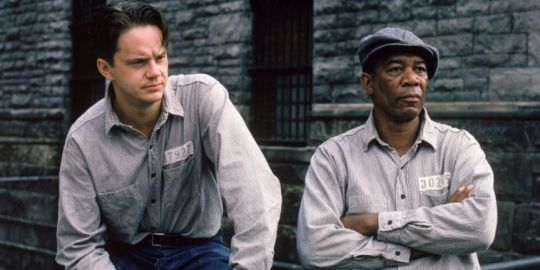
Frank Darabontâs prison-set directorial debut The Shawshank Redemption wasnât appreciated upon its original theatrical release. Due to competition from fellow 1994 classics Pulp Fiction and Forrest Gump and the fact that prison movies rarely become blockbusters, The Shawshank Redemption initially bombed at the box office. However, it has since been re-evaluated as a timeless gem that audiences can enjoy to this day.
RELATED:Â The 15 Best Quotes From The Shawshank Redemption
Thanks to ageless elements like Andy and Redâs endearing friendship, Roger Deakinsâ gorgeous cinematography, and the iconic final scene, The Shawshank Redemption still holds up today.
10 Morgan Freeman & Tim Robbinsâ Impeccable Chemistry Created An Endearing Friendship

Although The Shawshank Redemption is a large-scale epic that spans years of its charactersâ lives, Darabont tells the story through the intimate lens of Andy Dufresneâs friendship with fellow inmate Red. Morgan Freeman and Tim Robbins shared impeccable chemistry in the roles, making Andy and Redâs friendship ring true.
When theyâre done right, like Stand by Me, Frances Ha, or indeed The Shawshank Redemption, cinematic portrayals of friendship never get old because theyâll always be relatable to viewers with their own close friends. Freeman and Robbinsâ endearing chemistry as best buds makes Shawshank universally identifiable, despite its prison setting and hardened criminal protagonists.
9 Frank Darabontâs Sobering Portrayal Of Prison Life Is Refreshingly Realistic
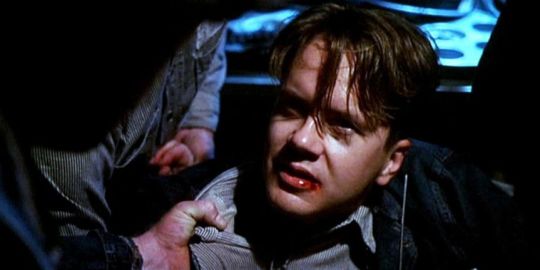
Most prison movies present a Hollywood fantasy of prison life with gang warfare and contraband smuggling and fistfights in the yard. By contrast, The Shawshank Redemption is refreshingly realistic, focusing on a regular everyman who finds himself in way over his head with a jail sentence.
The characters of Shawshank arenât tough-as-nails pulp archetypes. On their first night behind bars, a bunch of inmates can be heard weeping. Darabont doesnât shy away from depicting violence, but itâs not stylized; it feels soberingly real.
8 Roger Deakinsâ Naturalistic Cinematography Hasnât Aged A Day

Many contemporary reviews for The Shawshank Redemption singled out Roger Deakinsâ cinematography for praise. He even won an award from the American Society of Cinematographers for his work on the movie. The lifelike aesthetic that Deakins brought to the movie hasnât aged a day.
He didnât overstylize the lighting: he utilized naturalistic lighting in the daytime scenes and ominous lighting in the darker night-time scenes, like Andy being assaulted by a prison gang in an eerie, dimly lit wide-angle long take. Deakinsâ sharp eye gave Shawshankâs visuals a haunting sense of realism.
7 The Brooks Subplot Is Just As Heartbreaking Today

While the focus of The Shawshank Redemption is on Andy and his friendship with Red, James Whitmoreâs Brooks is the star of an engrossing subplot. The Brooks-centered B-plot offers a different perspective on life behind bars and the psychological effects it can have. Andyâs story has a happy ending, but Brooksâ story turns out much bleaker.
RELATED:Â 10 Hidden Details You Never Noticed In The Shawshank Redemption
After being released and struggling to readapt to civilian life, he etches âBrooks was hereâ on the wall of his room at the halfway house before solemnly hanging himself. This storyline is still just as heartbreaking today because Darabont conveys the tragedy visually instead of spelling it out.
6 Foreshadowing Makes The Movie Endlessly Rewatchable
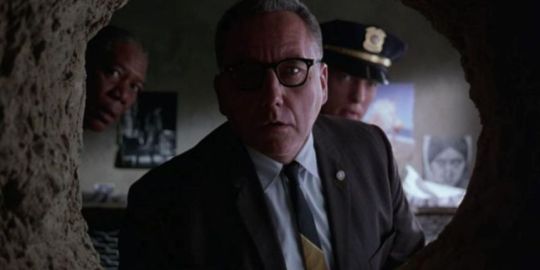
Darabont foreshadows the twist in The Shawshank Redemption so subtly throughout the movieâs first two acts that viewers donât catch the spoilers on their first viewing.
Red tells Andy that escaping from Shawshank is a âsh*tty pipe dream,â and Andy ends up escaping through an actual âsh*tty pipe.â The warden points to Andyâs Bible and says, âSalvation lies within,â and that Bible turns out to contain the hammer that Andy is using to tunnel his way out. These little hints of foreshadowing make the movie endlessly rewatchable.
5 The Ambiguous Morals Still Provoke Audience Discussions
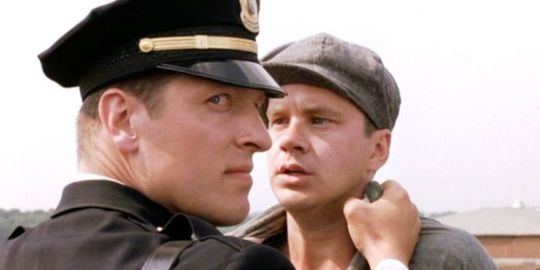
The morals of the characters in The Shawshank Redemption are complex and ambiguous. None of the characters are 100% good people: Andy is heavily implied to be guilty of the heinous crime heâs imprisoned for and even the guards are ruthless and corrupt.
Morality is a complex issue and, despite the black-and-white stories Hollywood is known for, very few real people fall neatly into the category of âgoodâ or âbad.â Most human beings are somewhere in the middle, like Andy and Red, and those complicated ethics still prompt audience discussions today.
4 It Takes A Few Viewings To Catch The Religious Symbolism
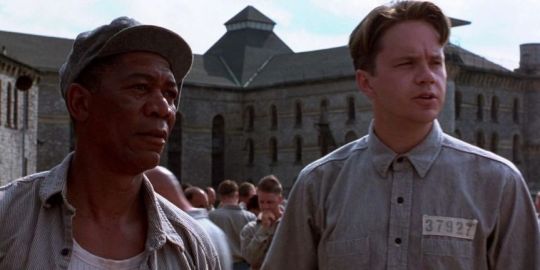
Movies that offer nothing beneath the surface of the story will only ever hold up to a single viewing. But the movies with subtext and symbolism hold up forever because it takes the audience a few viewings to catch it and even more viewings to dissect it.
The most common symbolic reading of The Shawshank Redemption is that Andy is a Christ figure. Red notes that he gives off a protective aura; The Marriage of Figaro record has been compared to the Holy Grail; and Andy bringing beer to his fellow inmates while they tar the roof can be seen as a parallel to Jesus serving wine to his disciples at the Last Supper.
3 Morgan Freemanâs Voiceover Narration Is Unceasingly Captivating

When voiceover narration is used to do the scriptâs legwork, the movie will age like milk. But when itâs used to complement the visuals and deepen the themes, the movie will age like a fine wine. Fortunately, thanks to Frank Darabontâs poetic writing and Morgan Freemanâs captivating voice, Shawshank falls into the latter category.
RELATED:Â 10 Behind-The-Scenes Facts About The Shawshank Redemption
As a seasoned inmate whoâs seen it all, Red is the wise observer who relates the story to the audience. His voiceover is never used lazily to cut corners on the storytelling, as the technique is often accused of; itâs always used to enhance the moment with some philosophical subtext.
2 Andyâs Escape Is A Triumphant Movie Moment
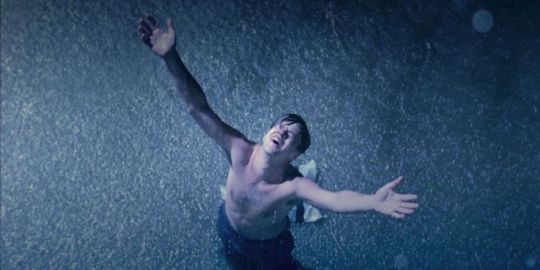
While movies need to hold up as a complete work, a couple of unforgettable moments will go a long way toward making a movie great. From the âtears in rainâ monologue at the end of Blade Runner to the Jack Rabbit Slimâs dance contest in Pulp Fiction, classic movie moments can make their films timeless gems.
The Shawshank Redemption has its own iconic movie moment. Nothing compares to the triumph of Andy finally escaping from prison and basking in his newfound freedom in the pouring rain. Audiences can enjoy the glory of that moment again and again.
1 The Happy Ending Is Well-Earned

According to CinemaBlend, Darabont originally planned to end The Shawshank Redemption the same way as Stephen Kingâs source material. It wouldâve shown Red taking the bus, but left it uncertain as to whether or not he reunited with Andy in Zihuatanejo.
Thankfully, the studio talked him out of it and the ending was changed to show Andy and Redâs reunion on-screen. After everything theyâve gone through, the audience deserves to see the two friends embrace one another on the beach. This well-earned happy ending provides the perfect conclusion to the movie. With Darabontâs original ambiguous ending, the movie mightâve been too disappointing or at least too confusing to hold up after all these years.
NEXT: 9 Ways Pulp Fiction Still Holds Up Today
#marvel #avengers #marvelcomics #spiderman #mcu #ironman #comics #captainamerica #thor #avengersendgame #marvelstudios #xmen #dc #marveluniverse #art #cosplay #tomholland #hulk #disney #comicbooks #dccomics #peterparker #tonystark #blackwidow #marvellegends #endgame #deadpool #marvelcinematicuniverse #loki #bhfyp
The post The Shawshank Redemption: 10 Things That Still Hold Up Today appeared first on undertheinfluencerd.net.
#entertainment, screenrant #tumblr #aesthetic #like #love #tumblrgirl #follow #instagram #photography #instagood #likeforlikes #s #likes #art #cute #o #girl #followforfollowback #a #tumblrboy #grunge #fashion #photooftheday #tiktok #l #photo #sad #k #frases #f #bhfyp
1 note
·
View note
Text
Can we walk across the waves, ser?
“Can we walk across the waves, ser?” asked Lysono Maar. In memory of Max, donations may be made to The Farley Foundation in Milton, Ontario which provides assistance to those in need who require help with the cost of caring for their pets, or to the Cobourg Public Library. Wars Set Photo Unveils Donald Glover as Lando CalrissianGlover is seen hunched over in what could be a cockpit, sporting a bright yellow jacket. And Crowfood Umber marches down the kingsroad, whilst the Karstarks approach from the east. In fact most of the time they are just going out with Mens ADIDAS ORIGINALS their girlfriends and looking for a good time so it is important that you come off as a fun guy and maybe even a bad boy right from the start. When the last of them bottines cloutees femme were gone, Ramsay Bolton turned his smile on Reek. “The silver queen is gone,” the ketch’s master told him. One day, a woman from a distant plantation called at her residence, and inquired for her. The committee for Good Samaritan Hospital's "Heart and Soul" fashion show is working to finalize plans for its fashion fundraiser scheduled for Feb. Do the gods have some other task for me? he wondered. Supplement these heavier waterings with daily mistings. The "Catcher in the Rye" is a very bright and ghete galbene piele deep book written in a very unusual way. We asked how she got the “broad stripe” made up... My school-friends will come and see us. Part of the Air 240's claim to fame is a trio of 120 mm fans for its dedicated motherboard chamber two intakes and one exhaust. He brought him to Washington for the purpose. Soon, you couldn think for yourself. Much that may seem evil can be good. Masloboev was wearing gorgeous Chinese slippers, a sumptuous dressing-gown, and dainty clean linen. A man option for business casual includes a polo shirt, collared shirt or sweater. A recently transplanted Manhattan ite said, "All my friends are here!" I probably fell asleep with a book on my chest. The AIR program, coordinated by Associate Director of Alumni and Parent Relations Stephanie Lamb '07, brings recent and more established Oswego alumni back to campus to share their knowledge and career experiences with current students. But the biggest feature of the shoe is its glow in the dark outsole that has an "X" on the forefoot area.. Question for the Giants, as they evaluate whether chanel ágynemű to entrust Schierholtz with an everyday job in the 2012 outfield, is whether he can stay healthy. All participants receive a certificate of participation. “It’s only been an idea before, Vanya, but now I have quite made up my mind. “Don’t be angry with my perfect frankness,” began Alyosha. The suitor risks a savage beating if he is caught by the woman’s kin, and worse than that if she herself finds him unworthy.”. A three goal run helped put the game out of reach as Thomas McAndrew, Liam Rheaume and Joe Licata all scored for the Bearcats. I could make out Elena sitting on the sofa, her head sunk on her breast as though plunged in deep thought. To demonstrate this effect the group has converted their radio reception of a cosmic ray event into a sound track (see below). “I was very much afraid of him; he began to talk of Mme. The writer has aimed, as far as possible, to say what is true, and only that, without regard to the effect which it may have upon any person or party. The master suites all have a five piece master bath and beautiful tile work. None of our yellow piss, thank you. Bloodbeard … that one has no taste for peace. We were all rejoiced that no conflict had ensued, and that the press was safe; and all felt that the crisis was over. They have no stoves or chimneys; some of them have something маратонки puma mercedes amg like a fireplace at one end, and a board or two off at that side, or on the roof, to let off the smoke. And why should I go up to a man if I see he’s nike air jordan 1 los angeles trying to avoid me? And do you know what I believe? If you weren’t drunk you wouldn’t have called to me even now. The woman was thoroughly black, thick-set, firmly built, and with strongly-marked African features. Lower fuel costs save airlines money and airlines make money they tend to buy aircraft, which is a great thing. When I fancied all that I couldn’t puma red bull racing evo cat ii restrain myself, but rushed to you as fast as I could; I ran here, and you were expecting me, and when we embraced after that quarrel I remember I held you in my arms as tightly as though I were really losing you, Natasha. John Siemsen retired from coaching after 20 plus years to take an assistant principal position. Varsity Baseball Coach Mike Johndrew who coached the team merged with Romulus, gave the Coaches Award to Tim Nicholson, the Most Improved Player Award to Brandon Morgan and the MVP to Kevin Close. The old men gather up what strength remains in them and announce that they are going hunting. If not for him being there wed be getting 150's as there wouldve been no platform for tharangs and seekkuge to score since the top 3 fell early. Yes, Vanya! air jordan aj4 I have come to the conclusion; if I’m not always with him continually, every minute, he will cease to love me, forget me, and give me up. Masloboev winked at me, triumphantly clicked with his tongue, an solemnly emptied his glass.. The only city that is dense is San Francisco and parts of Oakland. Thousands of football fans pure white sky probably that surely wall should tree wait in the Third World ?. “On what terms?” Beware the perfumed seneschal, Quaithe had said. “So many slaves … where are they all going?”. “I was beginning about my feather-headed boy,” the prince went on. “Promise me that you will never turn against me. “Volantis is the oldest of the Nine Free Cities, first daughter of Valyria,” the lad replied, in a bored tone. To us, with our feelings and associations, such discourses as these of Bishop Meade appear hard-hearted and unfeeling Mens JORDAN Hoodie to the last degree. And this trial is paraded as a triumphant specimen of legal impartiality and equity! “If the light that is in thee be darkness, how great is that darkness!”. At the same time the bottom will be blocked only way to pull air in would be side and exit from top. ‘Never go to battle naked, lad,’ he said. Clendenin / Los Angeles Times)After the Oscars flub that turned Tinseltown on its head, Hollywood was ready to dance it out. A boy king sits the Iron Throne. Never 58before, in the whole course of my life, have I been charged with a dishonest act. It takes a bus 5.5 hours to reach the rim. Poison. He lived his life with pride and he took pride in everything he did. I remained on deck all night, instead of rousing one of the men to relieve me; and nothing brought composure to my mind, but the solemn resolution I then made to resign myself to the will of God, and take with thankfulness, if I could, but with submission, at all events, air max 90 ultra se whatever he might decide should be my lot. I don't blame them, but I blame the airport.""You need a better response, especially in these kinds of conditions. Xaro was one of the Thirteen.
0 notes
Text
How Robin Hood: Prince of Thieves and Bryan Adams Conquered the World
https://ift.tt/eA8V8J
It’s that magic hour right after dawn when Robin Hood and Maid Marian approach the water’s edge. With the sun still low enough to cast both figures in mythic silhouette, the couple is surrounded by a blanket of fog, looking as if they’ve just stepped off a storybook cover. For most of Robin Hood: Prince of Thieves’ running time, the narrative and its music has built to this moment: A request, a kiss, and a declaration.
When Robin Hood asks the woman he loves to do him a favor—secret a message to her cousin—she doesn’t hesitate to say yes, but not for her King and not for her country. She simply says, “I’ll do it for you.” That is when composer Michael Kamen’s “Maid Marian” suite swells to operatic heights for the first time in the movie, losing itself in a swoon of its own orchestral making. The strings soar and the harps weep. And as Robin watches Marian vanish, her boat ferrying away into the mist, the heart of the grand and nutty Robin Hood: Prince of Thieves is finally revealed to have been on the movie’s sleeve this whole time.
Also, unbeknownst to either actor Kevin Costner or Mary Elizabeth Mastrantonio, the biggest pop hit of 1991 had just launched with Marian’s boat.
The simple musical melody of Kamen’s “Maid Marian” theme in this scene is almost head-to-toe the same musical composition of Bryan Adams’ “(Everything I Do) I Do It For You.” Adams and producer R.J. Lange adapted the material into a power ballad inside of 45 minutes. Of course it was common practice at the time to turn elements of a movie’s score into aspiring top 40 hits: Disney started doing it the same year with Beauty and the Beast; and Adams would try again two years later with Sting and Rod Stewart for The Three Musketeers; and of course there was Titanic just a few years after that…
But in ’91? It’s doubtful even Adams and Lange anticipated they were making the biggest hit of the rocker’s career. “Everything I Do” was a single many pop acts initially turned down, but by the end of that year it would spend 16 consecutive weeks at the number one spot on the UK Singles Chart—which is still the longest uninterrupted run ever—and 17 consecutive weeks on the U.S. sales chart (it would also enjoy seven weeks at number one on Billboard’s Hot 100, which combines sales and radio play).
Our own UK editor Rosie Fletcher recalled the delight millions of Brits had each Sunday when the Adams single was revealed again to be the most purchased and listened to pop hit.
“In the UK in 1991 the official top 40 was a Big Deal,” Fletcher says, “and much attention was paid to what was at number one on any given week. So much so, that many of us of a certain age would listen to the charts on the radio on a Sunday night, ideally on a tape deck with a blank C90 in hand. That way you could basically make your own mixtape of the charts that you could listen to throughout the week so you were guaranteed to know all the words to the most popular hits. There was no Spotify. Most people didn’t have MTV. This was the ‘90s equivalent of a download.”
She continues, “For this reason you will find an entire generation of Brits who know, without hesitation or looking it up, that ‘(Everything I Do) I Do It For You’ was at number one in the UK charts for 16 weeks. 16 weeks! That was a MASSIVE deal. So massive, that every week when it was STILL number one, we’d be amazed! How long will this go on? How long can it last?! And we would phone each other up on our landline telephones to discuss how amazed we were and we’d chat about it at school with our friends or on the bus, because there was no Twitter or Facebook or comments section to have an opinion about it on… That song was a legit cultural phenomenon and I still know every word.”
It cannot be overstated just how popular “Everything I Do” was that year. With its wistful guitar strings and angelic keyboard harmonies, the piece still oozes sweeping sentimentality and unabashed romance. It was so big, in fact, that for the VHS release of Robin Hood: Prince of Thieves, Warner Bros. Pictures placed the single’s original music video over the end credits—a fact which either the studio or Adams might’ve regretted since it is absent on subsequent DVD releases, and the only music video on YouTube is the one without clips of Costner’s well-coiffed hair.
For adults of a certain age—the ones who can remember the early ‘90s from the vantage of being a teenager or a child—Adams’ earnest bridge where he vows, “Yeah, I’d fight for you, I’d lie for you, walk the wire for you, yeah, I’d die for you!” is as entrenched in the memory as a national anthem.
All of which came back to my mind last week when Robin Hood: Prince of Thieves turned 30. Certainly a movie of its time, the film triggered a wave of retrospectives, but none as attention-grabbing or baffling as The Guardian’s latest slice of contrarianism entitled “Robin Hood: Prince of Thieves at 30: a joyless hit that should stay in the 90s.” As with many of the paper’s recent anniversary features, it seemed designed to gleefully tear down a pop culture relic from the early 2000s or 1990s that many readers grew up with.
But at least in the case of Prince of Thieves, the venom-laced arrow missed the target by several groves. Yes, there are many problems with Prince of Thieves. You can pick at Costner’s spotty “accent” (or lack thereof) and how filmmakers tried to turn Christian Slater’s Will Scarlet into an angsty heartthrob. Also the less said about the hackneyed revelation that the Sheriff of Nottingham is a Satanist, the better. Errol Flynn’s The Adventures of Robin Hood, this ain’t.
And yet, one of the many reasons the film was so successful in 1991 (and thereby unlike Hollywood’s two recent Robin Hood flops from the last decade) is because the movie is joyful. Filmed on location in the United Kingdom, the picture obviously has a grayer color palette than 1930s technicolor. But the newer movie is still imbued with the swashbuckling spirit of a rollicking romp.
That’s most obvious thanks to the oft-praised Alan Rickman performance, whose turn as the Sheriff of Nottingham is an inspired rendition of scenery chewing and arch-villainy. It’s a performance so deliciously evil that it steals the movie from Costner and won Rickman a BAFTA. But it’s not the only thing that works about the ‘90s touchstone. From Nick Brimble’s red-blooded introduction as Little John, which features the best cinematic rendition of that riverside brawl, to Sean Connery’s walk-on as King Richard the Lionheart, which still makes a play for the best movie cameo of all time, the picture is nothing if not mirthful in its swashbuckling gusto. It even ends with a literal wink to the camera.
But outside of Rickman’s dastardly turn, its enduring qualities are most apparent thanks to Kamen’s music. There’s a reason it conquered the world via “(Everything I Do) I Do It for You.”
Intriguingly though, Adams was not the first choice for the piece of music. The composer originally wanted the tie-in song to be written from the point-of-view of Marian, who indeed has the line, “I’ll do it for you” in the movie. Yet this concept was deemed too bland by the likes of Kate Bush, Annie Lennox, and Lisa Stansfield, who all turned the project down.
So Adams was approached and he instantly understood what the music needed—giving it a forlorn, unrequited grandeur. His vocals along with the earnestness of the film melded almost too perfectly, feeding off each other in a year which saw one become the song of the summer and the other the biggest box office smash of the season outside of Terminator 2.
This piece of music also stands as one of several tracks which have outlived its movie. Indeed, production company Morgan Creek quickly turned the high note of Kamen’s “Overture” into their new logo’s theme.
Kamen, who died in 2003 of multiple sclerosis at only age 55, was unapologetic in his lifetime about the sentimentality he strove for in both pieces. Primarily known for hyper masculine ‘80s actioners like Lethal Weapon or Die Hard before Robin Hood, the composer was visibly elated in 1990 while writing for Robin and Marian. You can see for yourself in the otherwise hopelessly dated behind-the-scenes special, “The Myth, The Man, The Movie.” Narrated by a misused Pierce Brosnan in his pre-007 days, the doc nevertheless includes a fairly candid interview with Kamen.
“I’ve carried an idea of who Robin Hood is in my mind since I was six,” Kamen enthused 30 years ago. “So that’s a pretty strong vision to have, musically.” For the composer it meant embracing the rousing heroism of boyhood in his overture’s opening march and to lean into the romance of a lakeside rendezvous.
“The basic theme is really simple,” Kamen said of Marian’s theme. But by the time it comes into the film, “We’ve been building it up for pages and pages and pages of music. And finally she kisses him, and that’s where the score turns black with notes and everybody goes [crazy]. This is a work of love. This comes from the heart. This is something I really, really care about. Music is a real substance. It’s a very powerful substance. It’s got to be taken seriously.”
He visibly did that day, as the camera catches him swooning as the orchestra reaches the crescendo of what became “Everything I Do.”
Said Kamen, “I guess I was in love with Maid Marian. Just looking at Kevin Costner give her a big kiss and thinking, ‘Man, that’s as close as I’ll get to that.’ I love that.”
cnx.cmd.push(function() { cnx({ playerId: "106e33c0-3911-473c-b599-b1426db57530", }).render("0270c398a82f44f49c23c16122516796"); });
In the summer of ’91, so did millions of others.
The post How Robin Hood: Prince of Thieves and Bryan Adams Conquered the World appeared first on Den of Geek.
from Den of Geek https://ift.tt/3j77fqb
1 note
·
View note
Text
Meeting MC’s twin
Note: Gn!Mav!MC x Heath, is after Andrei’s ending. Sooo…
SPOILERS UP AHEAD
YOU HAVE BEEN WARNED
Characters: Heath, Zhang, Morgan, mention of Andrei
Word count: 673
I am sorry for my grammar mistakes. English isn’t my first language.
Finally everything is ending now. The war had a winner, and you live with Heath happily ever after. At least he is the happy. But he is stuck at the television watching movies in your apartment. He almost never goes out. Well nothing you can do now is there.
Today your twin is coming visit to town. You already talked with Andrei about meeting with a human. He gave you permission to do so. It’s been almost a year since you two see each other. Well actually this evening. You both are identical twins, looking at yourself means looking at you twin. It’s weird, but you got used to it and it was always fun messing people with it. Even so they don’t know that you are a vampire, and it will stay as a secret.
It still sometime till they arrive so you wanted to feed first before you went to meet them. There is nothing in the fridge anymore. “Heath, I am going to get some blood, ok?” He answered still his eyes still stuck on the TV. “Yeah…”. You grabbed you jacket and went out. After a few minutes the movie ended. Then Heath noticed you weren’t there. He remembered you went to get some blood bags. But it feels really lonely without you. “I should get out and get some air.”. He stands up and goes out of the apartment and starts walking around the neighborhood.
It has been a really long time since he got out. It feels surreal. Being at home watching TV was the most comfortable thing for him. He takes out a cigarette and lights it up. He took a deep breath. On the corner of his eye he saw a similar face. Was that MC just now? He wasn’t sure, but either way he wanted to be with you. So he followed you. As he looks closer at them, he noticed they wore different clothes than you did. Before he thought more about it, they turned around after noticing that they were being followed. “Hey stalker! What do you want from me?” It took him by surprise by their face. It looked exactly like yours. He is speechless for a moment. “Uh? Hello? Someone there?” He got back his composure and started answering “Sorry, I really thought I were someone I knew.” They looked surprised by that comment “Really now? Who is that person then?” Before Heath could answer someone shouted “Wait, is that another me! Is this a dream!!” Both of them looked at you who was just got back from getting your blood.
Beside you was Zhang and Morgan. You met them while going back. Zhang wanted talk to you about Andrei wanted you to know. Morgan had the feeling something interesting was going to happen, so she followed you. Well she was right, there two of you standing here right now. You gave the bag of blood to Zhang and went up to your twin to give them a big hug. “You are early. You should have told me.” “Well, I wanted to check out Hollywood before the meeting.” “Wow, is the city more important than you twin?” “Says the one who didn’t call for a year” “Yeah…Sorry about that.” “Now we have time to catch up.”
While you two were talking Heath Zhang and Morgan looked at each other. Finally Morgan broke the silence between them ”Am I seeing right? Heath, did you know that they had a twin?” “No, I didn’t. I just met them.”
You turned to Heath and the others. “Let me introduce.” You point at Morgan and Zhang “That is Morgan and Zhang. They are my co-workers” you gesture to Heath “And he is my boyfriend, Heath” After hearing that Heath feels his inside brightening. “Boyfriend, huh?” Before Heath could say anything you ran up to Zhang grabbed the back and give it to Heath. “Now I am gonna catch up with myself. Can you bring this home?” Before he could protest you two wen
#red embrace: hollywood#red embrace hollywood#re:h#red embrace hollywood imagine#red embrace hollywood heath#red embrace hollywood zhang#red embrace hollywood morgan#red embrace: hollywood imagine#red embrace: hollywood heath#red embrace: hollywood zhang#red embrace: hollywood morgan#re:h imagine#re:h heath#re:h zhang#re:h morgan
9 notes
·
View notes
Photo















We join Andrei and are approached by a Golgotha that wants a meeting with Andrei, then Markus calls us to come to his shop, only to see he has been beaten up by some nasty Mavvar. While laying down injured, Markus seems to be imagining a much nicer place, with the sun shining, only to perhaps notice me the player for the first time...
With Markus not allowing us to help with his wounds, we call Aleusha to come help, but only get her answering machine. The nasty Mavvar that beat up Markus come back to finish the job by setting fire to the shop. Thankfully, Aleusha and some Mavvar come and chase away the thugs, revealing to us that the thugs are part of extremist clan that think they are doing what Randal wants but aren’t really.
After trying to have Saorise take in Markus for safety and her refusing due to the Iscari that would be a danger to Markus as much Randal’s Mavvar would be, Markus tell the MC that he loves them.😭
5 notes
·
View notes
Text
Shawnshank Redemption Review | Film Appreciation | Imdb Top Rated

Shawnshank Redemption (1994) Language - English One of the best movies ever made. As simple as that. The type you can watch again and again. Completely elderly and relevent in just about every ten years because it's release. Shawshank Redemption, based on a short by Stephen King, is one of the classics that are modern Hollywood cinema. Tim Robbins wasn't the selection that is first as manager Frank Derabont was adamant to secure Tom Hanks for the part. They would later collaborate on another classic, "The Green Mile". Tim however embraced Andy Dufresne's with such simplicity. In prison they do say many people are innocent. The doubt always continues to be if he's bad or not by not showing Andy performing the deed. Serving a complete life imprisonment, Andy finds Shawnshank prison in Maine (as it is any setting for King's tales). There he befriends Red (Morgan Freeman) and also the group. Morgan's role ended up being allowed to be Irish with purple locks. He had been brilliant that Frank decided to instead cast him but kept the name. Within the motion picture Andy requires him the reason why his name's Red to that he replies, "Maybe because i am Irish." Delicate but brilliant! Cracks me up everytime! The reason most of us notice Morgan Freeman in every voice over and fell so in love with that voice is this movie. Together with his narration along with his standpoint, we live on lives in all of those cellblocks, consume during the work or dining table when you look at the Read the full article
0 notes
Text
'All the King’s Men’: Your Guide and Non-Guide to the Post-Election United States by Steven Goldman

It’s shocking to realize we don’t have a good collection of cinematic equivalents to help us navigate the difficult post-election interregnum of 2016-2017. We have celebrations of democracy by the dozen and more dystopias than you can count, most of them science-fiction films more interested in dealing with the action possibilities created by political failure than with politics and governance. We also lack films that, depending on your political orientation, sincerely celebrate an ascendant American right wing or picture the United States on the edge of dystopia as a result of that same ascendency. Nor, for that matter, do we have too many films exploring either outcome as the result of a triumphal liberalism.
At the risk of employing an overbroad shorthand, whether embracing a point of view for or against their subjects, such films would be exploring the potential for an American fascism, which from certain perspectives is indistinguishable from the triumph of an American democracy. The word “triumph” is used pointedly, for this is one subtle but important message of Leni Riefenstahl’s 1935 Nazi propaganda masterpiece The Triumph of the Will. The overarching theme is of the deification of Adolf Hitler and a display of power and unity meant to restore Germany’s reputation after the supine years that followed the Great War, but the images themselves contain a warning: There are 700,000 people at this rally. This is a mass movement, and what is democracy but a mass movement? Democracy, freedom of thought and choice, the lasting gift of the Enlightenment, contains the seeds of its own destruction.
Thus did Benjamin Franklin say, on the eve of the adoption of the United States Constitution in 1787, “This is likely to be well administered for a course of years, and can only end in despotism, as other forms have done before it, when the people shall become so corrupted as to need despotic government, being incapable of any other.” He could foresee the way the downfall of democracy would work.
Only one major American film attempts to grapple with Franklin’s prophecy in anything like a realistic fashion and, despite winning an Academy Award for Best Picture, it makes a total hash of it. Put aside such flawed films as 1933’s Gabriel Over the White House, an outright plea for fascism in which the president is transformed by an accident into a galvanic one-man government, and Frank Capra’s 1941 classic/mess (a film can be both) Meet John Doe, which tries to have it both ways by simultaneously celebrating the goodness and gullibility of the people—only Robert Rossen’s All the King’s Men, a 1949 adaptation of Robert Penn Warren’s Pulitzer Prize-winning novel, takes place within a recognizable American political system utilizing characters drawn from the real world of the 1930s in its depiction of the attenuated rise of Governor Willie Stark. Modeled after Louisiana governor (later Senator) Huey Pierce Long, Stark in his cinematic form is meant to provide an object lesson in the corrupting nature of power. Consideration of both Stark and Long may help us better recognize where we are and where we may be going. If not for an assassin’s bullet, it might have been someplace we’d already visited.
Long (1893-1935) was the closest thing the United States has had to a dictator, and although his power was circumscribed by the borders of Louisiana, at the time of his death he was actively interfering in the politics of adjoining states and building a national organization that likely would have seen him try to challenge incumbent president Franklin Delano Roosevelt and split the Democratic vote in the 1936 election. The resultant repeal of Roosevelt’s Depression-fighting New Deal programs might have created enough political dysfunction that Long would have been elected by acclamation in 1940, possibly on a third-party ticket. He would have been beholden to no one in the existing power structure and imbued with dictatorial possibilities.
We’ll never know, but this was Roosevelt’s belief about Long’s maneuvers around him. What is certain is that Long’s national organization, the Share Our Wealth Society, claimed over seven million members at its peak and had been delegated to Gerald L.K. Smith, an avowed fascist and anti-Semite who was simultaneously seeking to affiliate with Hitler fan William Dudley Pelley’s Silver Shirts movement (as Benito Mussolini had Blackshirts and Hitler had Brownshirts, American fascism would be styled in argent tops) and would subsequently found the isolationist America First party to “preserve America as a Christian nation” against “highly organized” Jewish subversion. (At that moment, Jews were being highly organized into ghettos and gas chambers, but that was merely a pesky detail.) Such alliances, if Long was aware of them, would have been purely incidental to him. As he said, “I haven’t any program or any philosophy. I just take things as they come.” For Long, the means justified the end—securing and maintaining power for himself.
To understand All the King’s Men, it’s relevance to today, and where it let down as a guide to the issues it explored, even in its own time (which was contemporaneous with the rise of the House Un-American Activities Committee as a disruptive force in Hollywood and elsewhere, Richard Nixon, and Joseph McCarthy), we have to also understand Huey Long and where he and Willie Stark part ways. The Louisiana into which Long was born had long been neglected by its political establishment. In the post-Civil War world, the Republican party didn’t exist in the South. It has more life in California today than it had in the former Confederate states then. The lack of competition meant that the politicians in power didn’t really have to do anything. Sure, there were different factions within the southern Democratic Party that vied for power, but in the end, whoever won would end up cutting deals with the defeated segments to maintain the status quo. In that sense, each election was really a referendum on the distribution of graft.
The state suffered as a result. It is no insult to say it was a backwards place. As Robert J. Gordon wrote in his recent book, The Rise and Fall of American Growth, “Except in the rural South, daily life for every American changed beyond recognition between 1870 and 1940.” That is to say electrified houses? The rural South didn’t get that. Indoor plumbing? Nope. Cars instead of horses? No again, and as Warren points out more than once in the novel, most of those “horses” were actually mules. The illiteracy rate exceeded 20 percent among whites and therefore must have been appallingly high among African Americans. A state that was a patchwork of bayou and whose major city is wedged between the foot of the almost-inland sea that is Lake Pontchartrain and the Mississippi River had few bridges and almost no paved roads. New Orleans, the seat of the political old guard more so than the state capital of Baton Rouge, may have been a modern city—to a point; collusion between the government and the power utility limited even its development—but the countryside existed in a near state of nature.

No one in power cared so long as they got paid. This is the Louisiana Randy Newman sang about in the 1974 song which became an anthem in the aftermath of Hurricane Katrina in 2005. All of the above—Louisiana before Huey Long, the great Mississippi flood of 1927 (which is the subject of Newman’s song), and the aftermath of Katrina—are stories of the ordinary citizen being caught between hostile nature and an indifferent ruling class:
President Coolidge came down in a railroad train With a little fat man with a notepad in his hand. President say, “Little fat man, isn't it a shame What the river has done to this poor cracker’s land?”
Note that in the song President Coolidge only marvels at the destruction of the “poor cracker’s”—that is, the peasant farmer’s—land; he doesn’t offer any help. The real Coolidge didn’t even go to Louisiana when the Mississippi flooded in 1927, killing 500, displacing 700,000, and doing a billion dollars’ worth of damage. He did something worse: He sent Herbert Hoover. And Hoover, who didn’t believe government should do anything for anybody, called the Red Cross. For Louisiana, it was just more of the same, a continuation of the past and a preview of their “Heckuva job, Brownie” future. Huey Long claimed to be an alternative to all of that neglect. The problem was that no one knew if he was sincere or not.
Long expressed a lifelong interest in the poor and middle class, but also a lifelong ambition for political power. The maldistribution of wealth was his constant theme, first expressed publicly when he was still in his 20s. He would say that if one percent of the people consumed 99 percent of the resources, then 99 percent of the people had to survive on one percent of the resources. He had countless variations on this theme:
God invited us all to come and eat and drink all we wanted. He smiled on our land we grew crops of plenty to eat and wear… [But then] Rockefeller, Morgan, and their crowd stepped up and took enough for 120 million people and left only enough for 5 million for all the other 125 million to eat. And so many millions must go hungry and without those good things God gave us unless we call on them to put some of it back.
Long would eventually have a program to redistribute wealth in this country, a bold stance even in the Great Depression—anything that sounded like socialism or communism was feared and distrusted by the mainstream. Nevertheless, he insisted, “None shall be too big, none shall be too poor. None shall work too much, none shall be idle.” He framed this as a question of class struggle, right from the very beginning. “With wealth concentrating, classes become defined,” he wrote when he was 24. “There is not the opportunity for Christian uplift and education and cannot be until there is more economic reform.” As one of his slogans, borrowed from William Jennings Bryan, put it, “Every man a king, but no one wears a crown.”
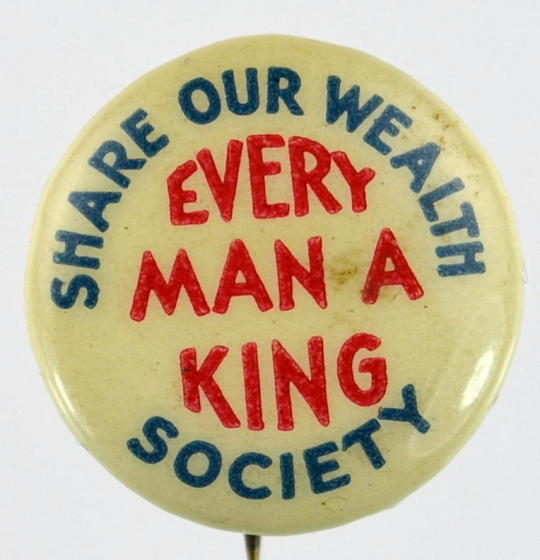
This was a fresh idea in national politics, but was as much a vehicle for Long’s own rise in the world as a sincere desire to better the lives of the non-wealthy classes. Long liked to say he was born in a log cabin, but it was kind of a nice, built-out log cabin, more or a log house, really, and if his family was far from rich, it was still comfortably situated relative to its community. Still, Long lacked the money to stick in college, and after some short stints at other institutions and a spell as a traveling salesman, he convinced Tulane to let him sit for the bar exam despite having put in only a year of study. He passed easily. From the moment he passed the bar, he said, he was running for office. In his mind, he had already been running. His siblings noted he had almost no appetite for doing physical work around the family farm and devoted more energy to nurturing his feeling that, as one remembered, “He was a man of destiny who was put here for a purpose.” He was still a teenager when he met his future wife, Rose McConnell. Soon after, she noticed he had an odd habit. As she later related to Long’s primary biographer:
He would write frequent letters on any pretext to United States senators. Naturally intrigued, she asked him why he did it. “I want to let them know I’m here,” he explained. “I’m going to be there myself someday.” …A little later he listed for her the offices he intended to occupy in progression—first, he would win a secondary state office; next, he would be elected governor; third he would go to the Senate; and finally and inevitably, he would become President. “It almost gave you the cold chills to hear him tell about it,” said Mrs. Long, shivering slightly… “He was measuring it all.”
Except for the last step, prevented by Long’s murder, this was pretty much what happened. At 24, Long was too young to run for most Louisiana offices, but he noticed that the state Railroad Commission didn’t have an age barrier. He won election to that body, which supervised utilities as well as railroads and immediately became a force in state politics, fighting Standard Oil, the real power in the state, calling the company an octopus and its executives, “the nation’s most notorious and leading criminals.”
From there, it was a short hop to the governor’s mansion in 1928. Long ran on a platform of changing the state tax code to make corporations carry more of the load and other reform-minded ideas. Once elected, he wasn’t like the previous political hacks who ran on reform platforms and then temporized once in office. Long actually did things. He provided textbooks to every school in the state, public and private; opened night schools to educate adults who might never have been to school; and pushed Louisiana State University into becoming a high-quality institution. He built free hospitals to give an impoverished populace a public health infrastructure. In a state that no one had bothered to pave, he created miles of roads and several dozen bridges. And, perhaps not least, he abolished the poll tax so as to extend the franchise to poor whites. (African Americans, alas, were still disenfranchised by other means.) Various other public works projects, such as a huge new statehouse, didn’t have much of a long-term point, but they were, on a small scale, what a state in a depression should be doing to stimulate employment.
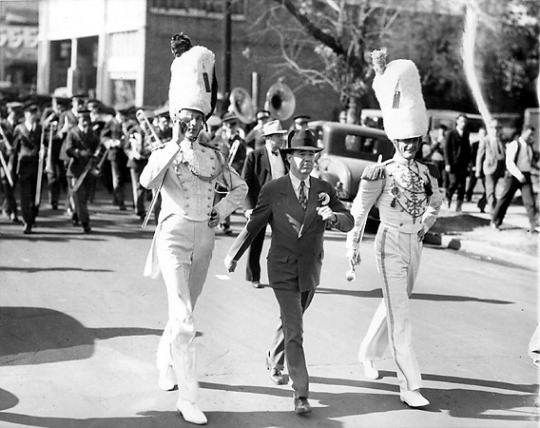
Long paid for these programs via the traditional route of bond issues and the non-traditional one of shifting, or attempting to shift, ever more of the burden onto Standard Oil and other companies extracting resources from the state. The response of the state’s old guard was to impeach him. Long beat back the challenge by bribing 15 state senators to abort the process. That was fair, in a sense; various other senators had been bribed to support impeachment. Louisiana was the eBay of corruption.
Once Long was safe, he took control of the state in a way that ensured he would never be challenged again. “I used to try to get things done by saying ‘please.’ That didn’t work and now I’m a dynamiter. I dynamite ‘em out of my path.” He began calling himself the Kingfish, after a character on the wildly popular radio show Amos ‘n’ Andy, and acted the part. His method of dynamiting can be boiled down to:
Patronage. He controlled every job in the state down to the school janitors. If he couldn’t cow a legislator, he could threaten the job of his sister, a teacher, and so on. This also allowed positive inducements. He could see to it that the sister was hired in the first place, or place the legislator himself on some state board that provided a second salary.
Graft. Long had 10 percent of the salaries of every state worker skimmed and placed in what was called the “Deduct Box.” This paid for Long’s national political activities and propaganda.
Flat-out kidnapping. At one point, an opponent was going to speak publicly against Long and also identify his mistress (of whom there were several). Long had him taken to a remote location for a while. When he returned, he was somehow a Long supporter. During the impeachment, he was accused of plotting the murder of an opponent as well.
The centralization of power. Long had the legislature pass laws that allowed the state to replace local governments that refused to go along with his plans. The state’s version of checks and balances had become so dysfunctional that the legislature was passing bills without even knowing what was in them. In one session, the legislature passed 44 bills in just over two hours. “The end justifies the means,” Long said. “I would do it some other way if there was time or if it wasn’t necessary to do it this way.” When a legislator put a copy of the state constitution in his hands, Long said, “I’m the constitution around here now.”
Extensive use of propaganda. Long was one of the first American politicians to grasp the possibilities of mass media. He made frequent use of the radio, originated the use of sound trucks at his rallies so he could reach more listeners, and had his own pet newspaper, which was paid for by proceeds from the Deduct Box.
Brazen “I dare you to call me on this” acts. For example, when Long wanted to replace the governor’s mansion and the legislature was slow to cooperate, he grabbed a bunch of convicts from the state penitentiary, handed them sledgehammers, and told them to demolish the place.
Unable to succeed himself as governor, he had himself elected to the U.S. Senate in 1930 but kept both jobs until he could engineer the election of a pliable successor who would allow him to continue running the state. Then he went to Washington and positioned himself to challenge Roosevelt. FDR tried to win him over, but in the end, he told an advisor that Long was one of the two most dangerous men in America, the other being Army Chief of Staff Douglas MacArthur. The general represented the possibility of a right-wing coup, Long the left.
“Let no one tell you that it is difficult to redistribute the wealth of this land,” Long said. “It is simple.” Hodding Carter, a Louisiana journalist and editor who was a dedicated anti-Long man to the extent he once took up arms against him, summed up the Share Our Wealth program this way: “A limitation of fortunes to $5,000,000; an annual income minimum of $2,000 to $2,500 and a maximum of $1,800,000; a homestead grant of $6,000 for every family; free education from kindergarten through college; bonuses for veterans; old-age pensions, radios, automobiles, an abundance of cheap food through governmental purchase and storage of surpluses.”
The math changed whenever Long spoke but never made any sense in any version; you couldn’t wring enough cash out of the rich to raise up the poor to that extent. The details, of course, would have been beside the point. “They think I’m so smart,” Long once said privately. “Maybe I’m not. Maybe it’s that there are a lot of dumb people in the world.” He was in basic sympathy with the Hitler-Goebbels idea of the Big Lie: Tell the people something they want to hear, the more incredible the better. They won’t check you.
FDR agreed. “Long plans to be a candidate of the Hitler type,” he said privately. He thought Long would fracture the New Deal coalition, ensuring a Republican winning the White House in 1940. Due to their laissez-faire philosophy, the Republicans would be unable to ameliorate the effects of the Depression. “That,” Roosevelt concluded, “would bring the country to such a state by 1940 that Long thinks he would be made dictator.” At about that time, Long was over at the Capitol, jokingly telling his colleagues, “Men, it will not be long until there will be a mob assembling here to hang Senators from the rafters of the Senate. I have to determine whether I will stay and be hung with you or go out and lead the mob.” No one laughed.
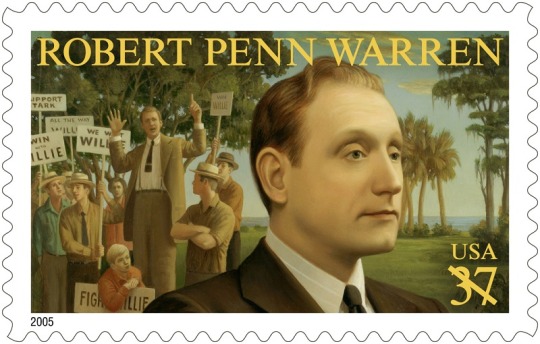
Watching all of this was Robert Penn Warren, a poet, novelist, and playwright then teaching at Tulane. The book that resulted won the Pulitzer Prize and is routinely listed among the best American novels in history. Goodreads has it ranked #58. David Handlin of The American Scholar listed it among the 100 best American novels published between 1770 and 1985. Time placed it among the 100 best English-language novels published since 1923. Book Riot placed it in the top 100 published from 1893-1993. The Guardian thinks it one of the 100-best novels written in English. The Modern Library list has it at No. 36, wedged between William Faulkner’s As I Lay Dying and Thornton Wilder’s The Bridge of San Luis Ray.
Briefly, the novel is the story of Jack Burden, an ex-reporter who is working for Willie Stark, the governor of an unnamed Southern state (pretty clearly Louisiana) as a right-hand man and fixer. Self-educated and slovenly but mentally sophisticated, Stark’s motto is “My study is the heart of the people,” but his real study is how to maintain his hold on power. When the elderly former state attorney general Judge Irwin comes out against the governor, Stark sends Burden to delve into Irwin’s background for some useful piece of blackmail. Irwin was something of a foster father to Burden, and he protests that the judge is clean. Stark disagrees: “Man is conceived in sin and born in corruption and he passeth from the stink of the didie to the stench of the shroud. There is always something.” Stark’s insistence causes Burden to immerse himself in his own past as well as the judge’s, and the more he discovers about both, the more collateral damage he and other characters suffer and the more he is forced to reevaluate his own beliefs.
Many summaries of the book refer to Stark as the main character, but in fact it is Burden, the first-person narrator. Stark is a catalytic that acts to change Burden, but undergoes no evolution himself and his perspective is never directly experienced. In short, as a novel All the King’s Men is Citizen Kane if the reporter was investigating the meaning of his own “Rosebud” instead of Charles Foster Kane’s. Demagogic politics and the Huey Long story are the environment in which Burden’s story takes place and motivates his self-searching, but are not in and of itself the point. To drive this home, the novel comes to a dead stop in the middle so that Burden can flash back to writing his graduate thesis, the story of a distant relative prior to and during the Civil War, whose experiences are an exact allegory for what Burden is going through.
The Civil War interlude is actually the best-written and most compelling part of the book, but since it’s so far off the trunk of the main plot, naturally screenwriter-director Robert Rossen lifted it right out when it came time to make the film for Columbia Pictures. This was probably inevitable regardless of which director, writer, or studio had gotten hold of the property—the Civil War interlude was a problem for the book’s original editors, the novel’s first British edition left it out altogether, and staged adaptations have done without it as well—but Rossen never found anything to replace it as the center of Burden’s story. The result is that the film of All the King’s Men doesn’t belong to any character at all. There wasn’t enough Stark material in the novel to make him the focus, Rossen didn’t invent any either, and despite receiving a Best Actor award for his portrayal, Broderick Crawford couldn’t find any depth in an underwritten character whose despotism is more alluded-to than dramatized. Burden (John Ireland) is still present as voice-over narrator, and though some viewers have been willing to see his ethics evolve over the course of the film, the arc of his character is barely sketched in.
This presents a huge problem for a film that is supposedly depicting the way an unprincipled leader might corrupt our politics and receive his comeuppance. The film does little to engage directly with Crawford’s political process except to indicate that he’s a slob in his comportment (he drinks and takes food off of other people’s plates) and that he’s willing to use Burden for what today we would call “oppo research.” The viewer is given silent montages of him haranguing voters and legislators (in 1949 this would have been a clear allusion to Hitler) with the same footage reused more than once. Instead, in both book and film the observer is supposed to understand his corruption through the way the better people, the snobs of the patrician old guard, react to him. They are shocked and appalled that there might be corruption going on in Louisiana, a very convenient case of amnesia given that this same political class had been running the state for their own benefit for years.
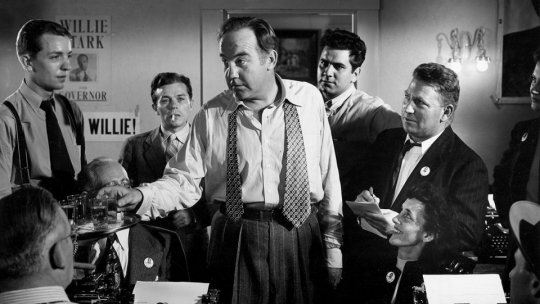
In the novel, the realization that it’s not just Stark but everyone who came before him who is corrupt sends half the characters into irreversible tailspins of disillusionment and triggers the book’s denouement. This requires spectacular naiveté on the part of the characters that is not believable. In the film, these developments are simply unmotivated.
It’s tempting to assign the film’s shortcomings to its production company. King’s Men arguably never should have been at Columbia at all. Into the 1940s, there was an informal bifurcation of Hollywood studios into a “Big Five” that included MGM, Paramount, Twenty Century-Fox, RKO, and Warner Bros., and a “Little Three,” containing Universal, United Artists, and Columbia. For Universal and Columbia, part of being relegated to the minor leagues was their lack of vertical integration: They owned few or no theaters. This helped protect them from the upheaval of 1948, when the United States Supreme Court forced the studios to divest of their theatre chains. Columbia had nothing and therefore lost nothing. More importantly, under production director Harry Cohn, Columbia kept things cheap and put out a more inconsistent product than the Big Five.
One thing Columbia largely didn’t do is bid on big properties. Going back to 1920, 13 of the 25 Pulitzer Prize fiction winners had been filmed more or less contemporaneously, some multiple times. MGM had five (most famously Gone With the Wind via David O. Selznick). Even RKO, always just hanging in there, had two. Columbia had none. The closest they came was adapting two Pulitzer Prize winners for drama, Craig’s Wife (1936) and You Can’t Take It With You (1938). Here too they trailed the major studios, with MGM making six such adaptations, Warner Brothers five, and Paramount four. What Columbia did was series: It had the Three Stooges (190 shorts), Blondie (28 films), Boston Blackie (14 films), The Whistler (eight films), Crime Doctor (10 films), and The Lone Wolf (19 films). Rita Hayworth musicals didn’t have a continuing character, but they constitute a series of a kind. Cohn liked dependable properties, not risky prestige vehicles. The studio didn’t even make a Technicolor film until 1943, and that was a safe Randolph Scott western.
Hollywood noticed. There were 21 years of Academy Awards prior to 1949. Columbia had 10 Best Picture nominations in that time, and two wins: It Happened One Night, 1934, and You Can’t Take It With You. MGM had had 38 Best Picture nominations, Warner Brothers 26, Paramount and RKO 19 each, and so on.
Both of Columbia’s winning films were directed by Frank Capra. He personally was responsible for six of the 10 nominations, George Stevens for another two (The Talk of the Town, 1942, and The More the Merrier, 1943). Capra’s creative well began to dry (the unsolvable puzzle of ending Meet John Doe seems in retrospect a sign), and he left to make propaganda films for the war effort, as did Stevens. After the war ended, the two teamed up with fellow director William Wyler to form their own production company.
Without Capra and Stevens, the studio spent a few years trying to find itself. Rossen was one of the new faces given a shot at putting Columbia back on a firm creative footing. He had written some notable films for Warner Bros, including The Roaring Twenties (Raoul Walsh, 1939) and A Walk in the Sun (Lewis Milestone, 1945) and was now trying to establish himself as a director. He had two pictures under his belt, 1947’s crime story Johnny O’Clock, with Dick Powell, and the boxing film Body and Soul with John Garfield, when the rights to King’s Men became available. Depending on the source, Rossen either bought the rights himself and then made a deal with Cohn or begged Cohn to buy them and let him write, direct, and produce. Cohn, who liked Rossen, acceded, but neither had the background to make much more than a B picture.
Writing King’s Men, Rossen encountered a political riptide of criticism from voices on both the right and left, and one suspects the book was only available to Columbia because its subject matter was too controversial for the conservative likes of L.B. Mayer or Jack Warner. A member of the Communist Party, Rossen envisioned John Wayne as Stark and sent him the script. Wayne’s far-right political sympathies were well known; that Rossen could conceive of him as a left-wing demagogue shows he recognized that the goals of left- and right-wing movements may differ but the optics can be painfully similar. Unfortunately, the Duke wasn’t buying. In fact, he was disgusted. In a 1971 Playboy interview he remembered, “Every character who had any responsibility at all was guilty of some offense against society. To make Huey Long a wonderful, rough pirate was great, but according to this picture, everybody was shit except for this weakling intern doctor who was trying to find a place in the world,” and through his agent told Rossen to shove the script up his ass.
At roughly the same time, the Hollywood 10, already blacklisted but still exercising ideological pull, met with Rossen to criticize the script’s lack of proletarian rigor. They subjected him to an inquisition which only concluded when he abruptly walked out, telling them to, “Stick the whole Party up your ass.” Between Wayne and Rossen, this was clearly a film that invited severe rectal trauma.
Deprived of Wayne, Rossen went with Broderick Crawford, a jowly, heavy-set middle-aged film veteran who had first gained fame as the original Lennie in the Broadway production of Of Mice and Men. Since then, he’d spent most of his career in supporting roles in gangster and western films with titles like Trail of the Vigilantes and Black Angel. One wonders what Orson Welles, who was around Columbia at this time making The Lady from Shanghai might have done with the part, but with Crawford in the lead, a strictly B cast fell into place around him: Ireland, best known today for one of the most notorious scenes of coded homosexual flirting in a studio-era film for the scene in Red River in which he and Montgomery Clift admire each other’s guns, as Burden; Joanne Dru, also from Red River, and far from the best part of it, as Anne Stanton, Burden’s childhood sweetheart; Shepperd Strudwick as her brother Adam, a noted doctor; and Raymond Greenleaf in the pivotal role of the judge. Only with Mercedes McCambridge as Sadie Burke, who—the film does a poor job of explicating this—is in the impossible position of serving simultaneously as a key political advisor and disrespected mistress, did Rossen hit a home run; McCambridge plays in a different league than the rest of the film’s performers. She won a deserved Academy Award for Best Supporting Actress.

Crawford’s Oscar for Best Actor, won over such worthies as Kirk Douglas, Gregory Peck, and, yes, John Wayne (for Sands of Iwo Jima), is harder to figure. It’s impossible to overemphasize how miscast he is. In reviewing the film, Bosley Crowther of the New York Times wrote, “Mr. Crawford concentrates tremendous energy into every delineation he plays.” That is to say he’s loud. Crawford was 48 years old the year King’s was made. The period of Long’s life roughly corresponding to Stark’s journey in the film took him from when he was 24 to his death at 42. As such, it’s disconcerting to see Crawford, overweight with greying temples and looking close to retirement age, attending to his collegiate studies in law.
Crawford speaks with an accent that doesn’t belong to anywhere in particular but sounds far more New York than Louisiana or anywhere else in the American South, and his cadences are oddly stilted for a supposedly rabble-rousing politician, though that might be on Rossen. As with Huey Long, Stark is impeached. As with Long, Stark’s supporters stage mass rallies at the capitol which are either spontaneous demonstrations of popular affection, staged attempts to intimidate the legislature, or both. Once the threat abates, Stark addresses them in a torchlight speech. Rossen adds touches to the dialogue that make it spectacularly awkward:
This much I swear to you. These things you shall have: I’m going to build a hospital. The biggest that money can buy. And it will belong to you. That any man, woman, and child who is sick or in pain can go through those doors and know that everything will be done for them that man can do to heal sickness, to ease pain. Free. Not as a charity. But as a right. And it is your right. Do you hear me? It is your right.
“These things you shall have.” Huey Long didn’t talk like that. Nobody talks like that. It’s not just the words, though, but Crawford’s elongation of every period in the passage above. “I’m going to build a hospital. [A PAUSE SUFFICIENT TO GO TO THE LOBBY AND BUY MORE POPCORN.] The biggest that money can buy. [ANOTHER LONG PAUSE. HOW ABOUT GOING BACK FOR SOME RAISINETTES?]”
For all its flaws, this scene is the heart of the film and still valuable. It’s a shame that the Hollywood 10 missed it as it does indict the very idea that an elected leader could give the people anything that should have belonged to them in the first place. Stark promises the people a glorious hospital so that they might have free healthcare, and asserts various other rights: The right to a complete education, to fair taxation, to toll-free roads. He concludes, “It is the right of the people that they shall not be deprived of hope.”

Burden watches the speech with Adam and Anne Stanton, both of whom will find themselves among the King’s “Men” in the course of the film. Hearing Stark’s summation, Anne asks, “Does he mean it, Jack?” Adam answers, “That’s his bribe.” Adam’s conclusion may do a disservice to the motives of both Stark and Long, but on the whole it’s true: Even the most beaten-down people don’t just sign up to be under the thumb of a dictator. You have to offer something in return, an incentive to get them to take their eye off the ball, which is, always, their own freedom.
If the film of All the King’s Men was to shift the focus of the story away from Jack Burden to Willie Stark, it would have been helpful for it to provide a realistic origin story for the character. Unfortunately, Rossen failed to improve on Warren, who gives Stark a thoroughly risible beginning as a small-town politician who objects to a schoolhouse being built with subpar bricks purchased through a kickback scheme. When the schoolhouse collapses, killing or injuring several children, he gains statewide notoriety. His “fall” from that place into Longism is not realistically dramatized, or realistic in any sense. Long was a megalomaniac, and his career was not a fall from a higher state of politics but a fulfillment of his nature. That reality is much more frightening: As Willie Stark himself says, man is born in corruption.
“Megalomaniac” is a melodramatic term, but an apt one. Perhaps all presidential candidates are touched by the disease. That is not to say they are possessed by it to the degree Hitler was, but that the very nature of their desires indicate an abnormality. In 1986, the British fantasist Alan Moore wrote this dialogue for the character John Constantine: “Me? I’m just an ordinary person with ordinary needs: Food, shelter, sleep, sex, recreation, and a safe world to enjoy it all in. That’s all most ordinary people want, all us poor, uncomplicated buggers. We’re harmless. It’s all the extraordinary people who are dangerous. The ones who wake up thinking, ‘Will I conquer Europe today?’ instead of ‘What’s for breakfast?’ That sort needs warning.” People who wake up thinking, “Sure, I could be the leader of the free world with the power of life and death over millions” are possibly just as dangerous, and we’re all dependent on their motives being benign.

If those who seek power are flawed to begin with, we’d be safer judging our own susceptibility to a rising Stark or Long by looking at our own circumstances. Then and now, the governor and his fictional alter ego were defined as populist demagogues. “Populist” was also applied to the diametrically opposed presidential candidates Donald Trump and Bernie Sanders in the 2016 election. Given the loose way the term has been used, it’s important to try to define it. A populist politician is one who does his campaigning from the point of view of what is essentially class struggle, blaming elites for the problems of the masses. Those elites can be big business or a shadowy cabal of international bankers, “the establishment,” fascists, or Communists. In short, populism is about us versus them.
Thus a Trump and a Long/Stark can be two sides of the same coin. The former aimed his appeals at a sector of the electorate that felt under attack by coastal elites on a social and economic basis. It’s jobs were, it felt, being exported, people who didn’t look like them were being imported, and both were being masterminded by a corrupt leadership exemplified by Hillary Clinton, who gave secret speeches to Goldman Sachs, used her foundation to enrich herself, and cared so little for any restraints on her own self-aggrandizement that she couldn’t even be bothered to cooperate with simple regulations about government emails. Long articulated vastly different goals than Trump’s—an alteration of the basic terms of capitalism as we know them—but his approach wasn’t all that different. He too railed against a corrupt alliance of business and government that bled the middle class and the poor. The appeal of both men, running for office in times of economic dislocation, was identical: I’m going to kick the money-changers out of the Temple.
What’s most interesting about this is that in both cases, neither attracted the support of the poorest members of society. They attracted people on the bubble. Thus when we say “economic dislocation,” we have to define that, too. Long was in power from 1928 through his assassination in 1935. That is, his appeal was rooted in the heart of the most severe economic crisis the nation had ever faced, the Great Depression. The appeal of radical approaches in such a desperate environment is obvious. Trump ran in what are, relatively speaking, good times: There are few who would argue that the “Great Recession” that began in 2008 isn’t over and that we’re on to something else now; if things aren’t as good as they were, they’re surely a lot better. Yet the aftershocks are still being felt, the healing isn’t equally distributed, and some ongoing pain, like the loss of industrial and mining jobs to technological change, has been understandably misattributed by its victims to elite-originated dislocation.
Thus, what historian Alan Brinkley wrote of Long’s followers still applies: They were not the worst victims of the Depression. “In many ways they suffered less. What set them apart from many of their colleagues was that they usually had more to protect: a hard-won status as part of the working-class elite, a vaguely middle-class life-style, often a modest investment in a home… They were people with something to lose. They were, therefore, people particularly susceptible to the messages [Long] transmitted: the defense of local institutions, the excoriation of distant power centers. Such men and women sense, if only vaguely, that the networks of local associations which gave their lives meaning were threatened by the emergence of a modern, integrated economy… What they shared was an imperiled membership in a world of modest middle-class accomplishment.”
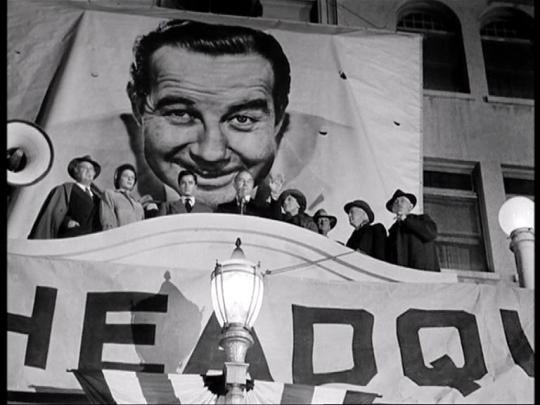
For those who followed the last presidential election closely, those words, written in 1982, should have a vivid familiarity. They represent the foundation of the Trump movement.
Willie Stark can be no guide to our future, nor can Huey Long, for each was murdered before we could learn what happens next. In The Populist Persuasion, Michael Kazin wrote:
Populism in the United States has made the unique claim that the powers that be are transgressing the nation’s founding creed, which every permanent resident should honor. In this sense, American populism binds even as it divides… The fact that the political actors were fighting over a shared set of ideals helped Americans to avoid the terrors to body and mind that have characterized the hegemony of revolution ideologies in other nations: fascism, Nazism, Leninism, Maoism, and the type of Islam that currently rules in Iran… Through populism, Americans have been able to protest social and economic inequalities without calling the entire system into question.
Except, and this is a big except, populism never before won a national election, and its very success may obviate the safety-valve function Kazin identified. What made Long threatening is that he broke with established American norms of political behavior. The same goes for Trump, either because of the nature of his white nationalist and nativist supporters, who are out of the American mainstream (or at least were until now); because his manner of comportment, whether on the stump, in business, or with women would have heretofore placed him beyond the pale of acceptability; or because of the intuitive understanding that you can’t respect what you don’t know, and Trump clearly knows neither our history or theory of government.
In Long’s day, with Hitler and Mussolini ascendant and the nation in disarray, the obvious sequel to the Kingfish’s rise seemed to be fascism. Even before Warren had begun his Long-inspired novel, Sinclair Lewis had published It Can’t Happen Here (1935, never filmed), about a Long-like figure establishing himself as a dictator. Lewis, as always, aimed towards satire, but the scenario wasn’t unrealistic. “There is no dictatorship in Louisiana,” Long said. “There is a perfect democracy there, and when you have a perfect democracy it is pretty hard to tell it from a dictatorship.” This is the chameleon nature of fascism as alluded to in Riefenstahl, and is similar to what George Orwell concluded in 1944 as he struggled to define fascism against overbroad use of the term: “It is impossible to define Fascism satisfactorily without making admissions which neither the Fascists themselves, nor the Conservatives, nor Socialists of any colour, are willing to make.” Long concluded, “A perfect democracy can come close to looking like a dictatorship, a democracy in which the people are so satisfied they have no complaint.”

In 1935, journalist Raymond Swing identified four preconditions for the rise of fascism in the United States: “the impoverishment of the middle class; economic stagnation; the paralysis of democratic government; and the threat of a strong Communist movement.” It seems likely that any other “ist” or “ism” can be substituted for “Communist” at this late date to serve as a galvanic threat. Thus the United States of 2016 is 4-for-4 on the Swing scale. Yet Swing may have missed one other element: The presence of a demagogue to exploit the issues populism raises.
“Demagogue” is not a well-defined term either, but a useful shorthand is that a demagogue is a parasite who feeds off the needs of the people to form a mass movement for his own benefit. He himself might have galvanized that movement; it doesn’t matter. The people have fears and frustrations. The potential leader perceives those emotions and channels them into a movement that builds something. The potential demagogue channels them into the acquisition of power for its own sake, the pursuit of anti-democracy. Long’s biographer, T. Harry Williams, defined a demagogue as “one of those swaggering blusterers, those base fellow who have throughout history deceived the masses with turbulent rhetoric, cynical promises, and clownish tricks.”
It was this stick that the great editor and columnist William Allen White was gnawing at when he wrote, “Fascism always comes through a vast pretense of socialism backed by Wall Street money… Huey Long is the type we must fear. Huey Long, backed by the Wall Street money on the quiet, rabble-rousing the morons into a belief that he was going to give them pancakes three times a day, is a menace.”
Well, you might say, there are a lot of people who need pancakes. Would it be so bad to give ‘em some? The answer is, “No, of course not,” but it matters who is giving them and how and why. You can’t debauch a constitutional system to any end, altruistic or selfish, and expect it to spring back into its old shape like it was made of memory foam. Once deformed, it stays deformed.
This is an issue that All the King’s Men raises, although the film, in its eagerness to beat the story into an dull-witted morality play, nearly throws it away. It’s no surprise that an adaptation would attenuate the characters’ longer speeches from the book, but in truncating this passage of Stark speaking to Adam Stanton, bits of which are thrown away with cinematographer Burnett Guffey’s camera hugging tightly to Crawford’s right ear (Guffey would later win Oscars for shooting From Here to Eternity and Bonnie and Clyde, but he and Rossen made some bizarre choices when shooting King’s) the film misses an important point:
“Goodness. Yeah, just plain, simple goodness. Well you can’t inherit that from anybody. You got to make it, Doc. If you want it. And you got to make it out of badness. Badness. And you know why, Doc?” He raised his bulk up in the broken-down wreck of an overstuffed chair he was in, and leaned forward his hands on his knees, his elbows cocked out, his head outthrust and the hair coming down to his eyes, and stared into Adam’s face. “Out of badness,” he repeated. “And you know why? Because there isn’t anything else to make it out of.” Then, sinking back into the wreck, he asked softly, “Did you know that, Doc?”
Then the Boss asked, softer still, almost whispering, “Did you know that, Doc?”
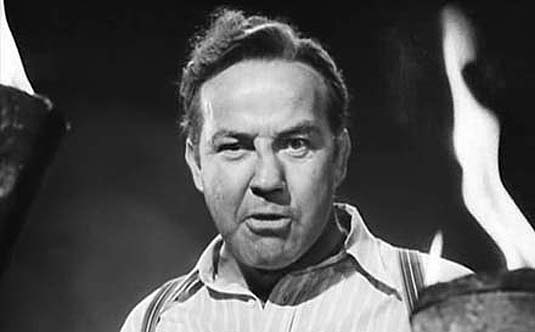
In reacting to All the King’s Men, those critics who clearly haven’t read it distort the meaning of the title, saying the allusion to the nursery rhyme “Humpty Dumpty” is about Willie Stark, the metaphorical king (standing in for Long, The Kingfish) taking a great fall. No, nope, sorry. Warren wasn’t that on the nose. If you think too much of Humpty Dumpty himself you’ve been misdirected. The title of All the King’s Men refers exactly to who it says it does: all the men (some of whom are women) who surround, support, and enable the king. These characters, all of whom are deeply wounded in some way, are corrupted just by being in his orbit and ultimately bring about his downfall. Stark’s destruction happens not through the direct actions of any of them, but because their behaviors are dictated by the environment he creates, they make decisions that inevitably have negative consequences. They disprove the philosophy expressed above: “Out of badness” only comes additional badness.
Long, one last time: “There are all kinds of demagogues. Some deceive the people in the interests of the lords and masters of creation, the Rockefellers and Morgans. Some of them deceive the people in their own interest.” But, no. It doesn’t work that way. As the historian Arthur Schlesinger, Jr. told Ken Burns, “Machiavelli long ago said a great man cannot be a good man. But there are limits to the methods a great man can employ in order to do good.”
This is an important thing to understand in terms of our own choices of leaders. Morality may be a pain in the ass and coloring within the lines boring, but the rules exist to constrain the possibility of bad outcomes. To take Richard Nixon as one example, the president created a win-at-all-costs environment in which his subordinates felt empowered to undertake a series of what they called “dirty tricks.” These in turn created circumstances in which Nixon himself committed crimes (obstruction of justice, among others) which ultimately resulted in the termination of his presidency. Unfortunately, the film of All the King’s Men does away with all such complexities. By making Stark obviously, loudly corrupt and the King’s Men shocked at his behavior, it isolates him, makes him an outlier, when in reality he’s a metastasizing cancer who causes his own great fall.
In an introduction to a later edition of his novel, Warren wrote that Stark was inspired by Huey Long, but was not meant to be him. “For better or worse, Willie Stark was not Huey Long. Willie was only himself.” Stark, Warren notes, was a symbol of “the kind of doom that democracy may invite upon itself.” That’s the kind of thing All the King’s Men could have shown us, but didn’t. As Hodding Carter wrote of Huey Long and surely would have written of Willie Stark, “Had all Americans lived some of those years under him, democracy would be more secure today, because democracy would have come to have a more precious meaning.”
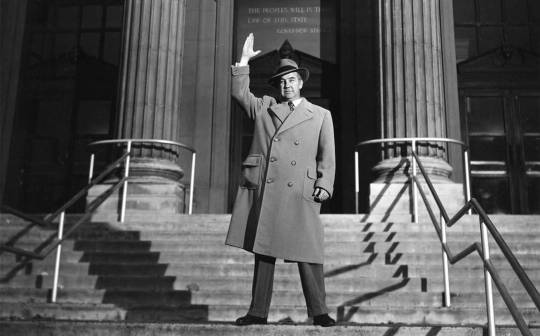
BIBLIOGRAPHIC NOTE: Sources for the quotations found in this essay include Voices of Protest (Alan Brinkley), Robert Rossen: The Films and Politics of a Blacklisted Idealist (Alan Casty), The Populist Persuasion (Michael Kazin), Freedom From Fear (David M. Kennedy), The Aspirin Age (Isabel Leighton, ed.), The Politics of Upheaval (Arthur M. Schlesinger, Jr.), Huey Long (T. Harry Williams).
#all the king's men#huey long#willie stark#robert rossen#robert penn warren#propaganda#fascism#populism#donald trump#bernie sanders#musings#oscilloscope laboratories
6 notes
·
View notes
Text
The U.S. and Taliban Sign Historic Deal
More →
Editor Picks
4: 24
Samsung Galaxy S20 Ultra 100X Zoom Camera Reviewed By a Private Eye
2/28/2020 10: 58AM
2/28/2020
Samsung’s Galaxy S20 Ultra provides up to 100X digital zoom, but who needs that kind of snooping power? A private investigator, that’s who. WSJ’s Joanna Stern teamed up with a New York-based detective to test it and compare it to other phones and ultra-zoom cameras. Photo illustration: Alex Kuzoian for The Wall Street Journal
1: 23
How the U.S. Is Preparing for More Coronavirus Cases
2/28/2020 1: 57AM
2/28/2020
4: 16
Why Israel Keeps Having Elections–And What’s at Stake
2/27/2020 11: 14AM
2/27/2020
5: 42
Trump Announces Pence Will Lead Coronavirus Response
2/26/2020 8: 40PM
2/26/2020
1: 28
Coronavirus Threatens Tokyo Olympics
2/26/2020 8: 36AM
2/26/2020
More →
More →
Tech
3: 05
Antoni Porowski on the Future of Food
2/27/2020 10: 00AM
2/27/2020
“Queer Eye” host Antoni Porowski explains why blueberries are better than cauliflower rice and predicts where he’ll be in a decade.
5: 09
How Governments Shut Down the Internet
2/25/2020 10: 30AM
2/25/2020
5: 11
The Risks and Rewards of Mobile Voting
2/21/2020 7: 30AM
2/21/2020
5: 29
How You Cast a Vote Depends on Where You Live. Here’s Why
2/21/2020 5: 30AM
2/21/2020
3: 23
Imogen Heap on Making Music With Machines
2/20/2020 10: 00AM
2/20/2020
More →
Recommended for you
2: 01
Three Reasons Bernie Sanders Has Been Left Unscathed by Opponents
2/25/2020 5: 30AM
2/25/2020
Democratic candidates have been relatively easy on Bernie Sanders. WSJ’s Gerald F. Seib explains why his opponents have been reluctant to go after the Vermont senator. Photo: Drew Angerer/Getty Images
2: 06
Deadly Protests Break Out in India During Trump’s Official Visit
2/25/2020 12: 29PM
2/25/2020
1: 42
Coronavirus Has U.S. Stocks Capping Their Worst Week Since 2008
2/28/2020 6: 00PM
2/28/2020
1: 27
Multiple People Killed During Molson Coors Shooting
2/27/2020 12: 22AM
2/27/2020
2: 01
New Coronavirus Cases Surge Outside China
2/24/2020 4: 15AM
2/24/2020
1: 02
The U.S. and Taliban Sign Historic Deal
2/29/2020 12: 26PM
2/29/2020
5: 11
The Risks and Rewards of Mobile Voting
2/21/2020 7: 30AM
2/21/2020
5: 42
Trump Announces Pence Will Lead Coronavirus Response
2/26/2020 8: 40PM
2/26/2020
4: 16
Why Israel Keeps Having Elections–And What’s at Stake
2/27/2020 11: 14AM
2/27/2020
4: 02
Religious Sites in the Spotlight as Coronavirus Spreads in the Middle East
2/28/2020 1: 30PM
2/28/2020
4: 24
Samsung Galaxy S20 Ultra 100X Zoom Camera Reviewed by a Private Eye
2/28/2020 10: 58AM
2/28/2020
More →
Video Series
My Ride
Moving Upstream
In the Elevator With
A Brief History Of
More →
More →
Opinion
2: 57
Opinion: Democrats Block FISA Reform
2/27/2020 7: 33PM
2/27/2020
Potomac Watch: House Democrats seem willing to jeopardize national security in order to keep their Trump-Russia collusion narrative alive. Image: J. Scott Applewhite/Associated Press
1: 18
Opinion: The Coronavirus Isn’t Partisan
2/27/2020 7: 30PM
2/27/2020
2: 41
Opinion: Reality Sets in for Desperate Democratic Candidates
2/26/2020 8: 31PM
2/26/2020
1: 00
Opinion: Democratic Candidates Share Personal Mottos and Misconceptions
2/26/2020 8: 29PM
2/26/2020
0: 54
Opinion: Cuba Haunts Sanders in Democratic Debate
2/26/2020 8: 26PM
2/26/2020
More →
More →
Life & Culture
1: 33
Weinstein Guilty of Sex Crimes, Acquitted of Most Severe Charges
2/24/2020 3: 56PM
2/24/2020
Hollywood producer Harvey Weinstein was found guilty of third-degree rape and first-degree criminal sexual act following a six-week trial. Manhattan District Attorney Cy Vance called the conviction “the new landscape for survivors of sexual assault.” Weinstein has denied all allegations of nonconsensual sex. Photo: Peter Foley/Bloomberg News
5: 47
Why Trendy Cosmetic Brands Keep Getting Bought Up
2/24/2020 5: 30AM
2/24/2020
3: 35
Designer Eileen Fisher’s Future of Fashion
2/18/2020 10: 00AM
2/18/2020
4: 39
How Victoria’s Secret Lost Its Grip
2/14/2020 7: 00AM
2/14/2020
3: 55
Hollywood Icon Kirk Douglas: A Life in Film
2/6/2020 11: 09AM
2/6/2020
More →
More →
Business News
2: 01
Three Reasons Bernie Sanders Has Been Left Unscathed by Opponents
2/25/2020 5: 30AM
2/25/2020
Democratic candidates have been relatively easy on Bernie Sanders. WSJ’s Gerald F. Seib explains why his opponents have been reluctant to go after the Vermont senator. Photo: Drew Angerer/Getty Images
2: 06
South Korea on Red Alert as Coronavirus Cases Soar
2/24/2020 5: 46AM
2/24/2020
5: 38
Coronavirus Hits Companies in China, But They Still Have Reason to Stay
2/21/2020 9: 37AM
2/21/2020
2: 01
Why Morgan Stanley’s Investors Aren’t Sure About The E*Trade Buyout
2/20/2020 6: 13PM
2/20/2020
1: 26
How Coronavirus Test Kits Work
2/20/2020 5: 19AM
2/20/2020
More →
More →
Moving Upstream
9: 56
Electric Scooters: Israel’s Two-Wheeled Solution to Traffic and Sabbath
12/20/2018 5: 30AM
12/20/2018
Electric-scooter rental companies are hitting speed bumps in the U.S. over safety and other concerns. But in Tel Aviv, one in 10 residents has rented a Bird e-scooter, and the city appears to be embracing them. WSJ’s Jason Bellini takes a look at the challenges and potential lessons of the e-scooter craze.
0: 54
Tasting the World’s First Test-Tube Steak
12/11/2018 5: 30AM
12/11/2018
9: 58
High Insulin Prices Drive Diabetics to Take Extreme Measures
12/3/2018 5: 30AM
12/3/2018
9: 57
Weighing the Costs and Benefits of Facial Recognition Technology
11/19/2018 5: 30AM
11/19/2018
9: 54
The Future of Flight: AI in the Cockpit
11/12/2018 5: 30AM
11/12/2018
More →
More →
Mansion
6: 39
WSJ’s House of the Year: A Contemporary Home With Hawaiian Spirit
1/30/2020 11: 00AM
1/30/2020
A modern, 7,500 square-foot home connects owner Elizabeth Grossman to the nature and ‘spiritual vortex’ that drew her to Lanikai, a neighborhood on Oahu. She gives us a tour, and explains why it’s time to sell. Photo: Adam Falk/The Wall Street Journal
8: 00
In Greece, a Radical Triangular House Brings the Outdoors Inside
12/21/2019 11: 00AM
12/21/2019
5: 10
A Love of Yurts Inspired This ‘Glamp’ Retreat
7/11/2019 7: 00AM
7/11/2019
5: 38
A Cascades Home Designed to Feel Like Summer Camp
5/2/2019 10: 00AM
5/2/2019
4: 53
A Home Built to Be a Live-In Museum and Expansive Library
2/21/2019 11: 00AM
2/21/2019
More →
More →
Sponsored
27: 34
Sponsored
Creating the Future Workforce
1/17/2017 3: 39PM
1/17/2017
2: 21
Sponsored
Am I Doing What I Love?
9/22/2016 11: 59PM
9/22/2016
1: 00
Sponsored
Golf’s Data Revolution
9/9/2016 2: 16PM
9/9/2016
1: 30
Sponsored
How Worldly Experiences Can Shape One’s Success
1/24/2018
1/24/2018
More →
More →
Marketwatch, Moneyish and Barron’s
3: 12
Why 3D mapping could be key in the creation of ‘smart cities’
2/28/2020 7: 00AM
2/28/2020
Telecom operators will invest as much as $275 billion nationwide over seven years to build out 5G networks. Here’s how this could enable the creation of ‘smart cities’ through new dynamic mapping technologies.
3: 07
Will Central Banks Trigger the Next Recession?
2/25/2020 4: 07PM
2/25/2020
1: 08
Bank of America on the Fed’s Next Move
2/25/2020 3: 56PM
2/25/2020
1: 32
Tips for Potential Home Buyers, According to Bank of America
2/25/2020 3: 51PM
2/25/2020
1: 20
J.P. Morgan Private Bank’s Growth Trends for 2020
2/25/2020 3: 42PM
2/25/2020
More →
%%
from Job Search Tips https://jobsearchtips.net/the-u-s-and-taliban-sign-historic-deal/
0 notes